So, a few of my friends have shared this post about the protests surrounding curfews at the women's dorms of Fu-Jen Catholic University in New Taipei (link in Chinese).
I understood despite my piss-poor Chinese reading ability that the women's dorms have a curfew and are locked after that time, while the men's dorms are not - and this has not changed despite an ongoing dialogue with the administration that tends to agree and avoid rather than actually discuss the issue. The protestors (who seem to be organized as FJU Cinderella) are giving press conferences and engaging in a hunger strike.
Yes, the entire reason for the curfew is that the powers that be are terrified of female sexuality. It's not for safety reasons, or because there is some sort of known threat, or even for legal reasons. It's because those nice young university girls might (gasp!) be sexually active and do what they please with their bodies. We can't have that now can we! So many pearls to clutch, so little time!
My first thought, though, was not "Taiwan can be really conservative!" - it was not to attribute this particular problem to Taiwanese culture at all but rather to religious, especially (but not limited to) Catholicism. American-style fundie nonsense comes to Taiwan!
I realize there is a certain prudishness about Taiwanese culture as it is, and many aspects of life here are dealt with more conservatively at home for reasons that have nothing to do with Western influence or Western religion. As a friend put it, culture in this part of the world started to turn prudish in the 19th century before missionaries even got here. But, that prudishness can't be analyzed along Western lines, because it absolutely does not follow them (where in the West are you going to find sexy church dancers along the lines of Taiwan's sexy temple dancers?), and in many ways Taiwan is not all that conservative. I've said several times it is, in my experience, more progressive than any other country in Asia by a very wide margin.
That prudishness does come out in college dorm rules - but it seems to be equally meted out to men and women. At least, as far as I have been told (I have never lived in a dorm here), while women's dorms often don't allow male visitors at all or after certain hours, and many have curfews, that men's dorms do too. The double standard that men can play but women must keep their legs closed (and only the 'bad sort' of women let the men play) seems, to me, to come out later in life when wives are supposed to be forgiving of their husbands' indiscretions, men are seen as horndogs unable to help themselves, but mistresses are evil succubi and unnatural she-beasts. At college age, the censure against sex - because, again this is about sex plain and simple - seems to be aimed at both young women and men.
As per my memory, when my sister attended NCCU no men were allowed in her dorm, but she was likewise not allowed in the men's dorms. I've been told by Zhongshan alumni that the men's dorms are further up the mountain, cloistered away farther from main campus life (and therefore more susceptible to monkey invasion) than the women's dorms.
But, all I know is what I've been told by people who have actually had Taiwanese college dorm experiences. If I'm wrong about this or you have counter examples (or examples that support this view), please do leave them in the comments. I'm entirely open to being wrong about this as I am not writing from direct experience.
If that is true, however, the practice of keeping women under lock and key but not men, to me, feels like more of a religious stick-up-the-butt than a cultural one. That it's Catholicism, specifically, causing the problem here with the church's outdated and frankly offensive views on women's rights and equality. (I want to emphasize this as an establishment problem, not a personal one: just because the church has views I find repugnant doesn't mean those who identify with that religion necessarily have similar views. It is absolutely possible to be an openminded, even feminist, Catholic, though it does entail differing with the church on certain issues).
That's not to say that very traditional thinkers in Taiwan aren't woman-blamers and chauvinists: many are. A student of mine from a college in Danshui told me about how her father lets her brother sleep at friends' houses, doesn't have a curfew for him when he is home, and lets him stay in the dorms at his own university, whereas she is expected to live at home with her parents and commute to college, and be home by a certain time. This attitude is not unheard of here. It just doesn't strike me as the reason why the women are locked up like untrustworthy lusty schoolgirls while the boys are allowed to hot-dog it all over town without censure. No thought given to the notion that young people are gonna get it on (to be honest, not me, despite living in a co-ed dorm freshman year - I was a hopeless nerd and kind of still am), and that's only a problem if you make it one by not educating them properly or by thinking its somehow wrong or unnatural.
That, to me, feels particularly religious in origin. I hear echoes of the Republican party and religious right in it. Hell (pun intended) it's one of the many reasons I left the US: as an atheist I was sick of public discourse being skewed so far to the right that moderates in the US look conservative in every other Western country, and liberals in the US are moderates by any reasonable standard elsewhere. I am a flaming liberal by American standards but pretty moderate by European ones, and I see myself as a moderate. I'm not a Communist or anarchist after all and I am married, which is a pretty establishment thing to do, although I would not say I have a traditional marriage. I was sick of being demonized for not only not believing in God, but not believing in the whole raft of misogynistic bullshit that seems to come with strong religious faith. The whole aspirin-between-the-knees victim-blamey "she had it coming wearing that skirt" "boys will be boys" purity ring flood of pure stinky douche that has poisoned and divided my own clumsy culture by creating a culture war that nobody with any sense wanted.
I would hate to see it start up here. Taiwanese culture grows more progressive by the day. The last thing it needs is a bunch of Western-style fundies screwing it up.
Monday, May 30, 2016
Wednesday, May 25, 2016
Sad buttclown nobody cares about calls Tsai "extreme" because she's a single woman
"She's so extreme because she's single"
HAHAHAHAHAHAHAHAHAHAHAHAHAHAHAHAHAHAHAHAHAHA
AAAAHHhhhahaha ha ha ha ha ha ha ha h ah ah ahahaha h a ha ha ha ha ha ha ha ha ha hah a
BWAAAAAAAHAHAHAHAHAHA
hahahahahahahahahahahahahahahahahahahahahahhahahahahahahahahahahahahahahahahahahaha
哈哈哈哈哈哈h哈啊哈哈哈哈哈哈哈哈哈哈哈哈啊啊哈哈哈哈哈哈哈哈哈哈哈哈哈哈哈
哈哈哈哈哈哈哈哈哈哈哈哈哈哈哈哈哈哈哈哈哈哈哈哈哈哈哈哈哈哈哈哈哈哈
hahahahahahaha HHHHAAAAAAAAAAA
BBBBWWWWWAAHAHAHAA AHA HAAHAAHHAAA
hhhhaahahahahahahahahahahahahahahahahahahahahahahaahahaha
This is the entirety of my opinion on the matter and I will defend it to the end as succinct and accurate.
HAHAHAHAHAHAHAHAHAHAHAHAHAHAHAHAHAHAHAHAHAHA
AAAAHHhhhahaha ha ha ha ha ha ha ha h ah ah ahahaha h a ha ha ha ha ha ha ha ha ha hah a
BWAAAAAAAHAHAHAHAHAHA
hahahahahahahahahahahahahahahahahahahahahahhahahahahahahahahahahahahahahahahahahaha
哈哈哈哈哈哈h哈啊哈哈哈哈哈哈哈哈哈哈哈哈啊啊哈哈哈哈哈哈哈哈哈哈哈哈哈哈哈
哈哈哈哈哈哈哈哈哈哈哈哈哈哈哈哈哈哈哈哈哈哈哈哈哈哈哈哈哈哈哈哈哈哈
hahahahahahaha HHHHAAAAAAAAAAA
BBBBWWWWWAAHAHAHAA AHA HAAHAAHHAAA
hhhhaahahahahahahahahahahahahahahahahahahahahahahaahahaha
This is the entirety of my opinion on the matter and I will defend it to the end as succinct and accurate.
Taipei: The New Old Berlin
So I was reading this article about how Berlin has changed and, as I read it, something about the old, pre-cool Berlin that the writer describes felt familiar.
I can't point to any one quote that captured this for me, just an overall feeling - a modern, capitalist, free city (well, half-free) that was not particularly inviting to outsiders, was off the beaten track, and was full of grubby neighborhoods that you could live in if you wanted cheap rent. If you were there it was because you wanted to be there, and not anywhere else, but anyone who wanted to be anywhere else generally did not give Berlin a second look. The "beautiful people" were in other cities (London, Paris, Milan).
And I realized, it reminded me of Taipei now. Taipei is not particularly cool. It doesn't have the cachet with Westerners that Shanghai, Beijing, Hong Kong or Tokyo (or more recently, Seoul) do, or even Bangkok or Singapore. Tourists from other parts of Asia come here but it is not a global tourist hotspot by any standard, and wasn't a tourist hotspot at all until Chinese tourism opened up. You are here because you want to be here - at least I am here for that reason - and not anywhere else. It's very local, and looming just across the straight is a massive Communist threat. I highly doubt Chinese missiles are going to rain down on my head anytime soon, but some days you can't help but wonder and be reminded of that during the occasional air raid drills. The beautiful people are in those other cities, and with them their beautiful overpriced nightspots and commercialized bar and restaurant scenes.
It can be nice and shiny and new - look at Xinyi (or don't - I kind of prefer not to). But entire neighborhoods are a bit grubby, and you have to look more deeply to find their charms (which they do have). It's so cool because it's not cool at all.
And, like that older version of Berlin, you have to work to understand it, and you might not always like it at first. You may remember that I did not really like Taipei when I first arrived. It was hard - foreigners generally make friends with coworkers when they first land but I didn't care for most of mine (the ones I liked I still didn't feel that close to, and they have pretty much all since left Taiwan). I cried on my birthday, after eating dinner alone at a terrible Indian restaurant, two weeks after arriving, on the Muzha line MRT because I could look down through rain-streaked windows at people on the street all going somewhere they belonged and probably seeing people who cared about them in lives that were anchored in some way, and I had none of those things. It took another year or so before I felt like Taipei was alright, and probably another year after that before I began to really feel it, and Taiwan, was someplace special.
As an aside, so far I can count on one hand the number of people who know why this blog is called Lao Ren Cha. There is no special reason why I don't publish the reason publicly other than I never really felt like it. The people who know I felt, for whatever reasons I had at the time, deserved to know. Some still do! But, it's not a big deep secret, and perhaps someday I will write about that. What I'll say now is that it was very much intentional - not just a pretty name - and is very much directly related to my experiencing Taipei first in a muddy, dark, monochromatic sepia and only later a stunning, clear azure blue. It took more time than you would ever think such a thing would require.
And I'm not alone - when my cousin visited recently and stayed for a semester, he took time to adjust too. At first absorbing everything, then feeling a bit down due to the unrelentingly bad weather, then finally realizing one day that he had a solid group of friends and that Taipei was a super cool city to be in. The Taipei effect is not immediate.
I do wonder, as Taipei gets cooler - maybe not Seoul-level cooler but cooler nonetheless, with its plethora of perfect little cafes and increasing number of tour buses, increasing rents and gentrifying neighborhoods if it will start to become a victim of its own coolness. Part of me hopes it will bypass the Brooklyn effect, as it feels like it's already become too expensive to truly be a hip haven - and all the cool kids are already taking advantage of the better weather and cheaper rents in Tainan.
I wonder, I guess, if in 10 years (assuming I am still here, which I may be), what was an off-the-beaten track choice for building a life in Asia will start to be THE place to be and it will start to lose some of its street-level vibrancy and slightly grubby charm. Will I feel like that disaffected old expat in 10 years, complaining about all the new kids and how "this city isn't what it used to be"?
Yes, I do realize expats before me have already said that, but I wasn't here then so LA LA LA I CAN'T HEAR YOU.
Part of me wants Taipei to get that international recognition. Part of me wants it to stay the way it is.
I can't point to any one quote that captured this for me, just an overall feeling - a modern, capitalist, free city (well, half-free) that was not particularly inviting to outsiders, was off the beaten track, and was full of grubby neighborhoods that you could live in if you wanted cheap rent. If you were there it was because you wanted to be there, and not anywhere else, but anyone who wanted to be anywhere else generally did not give Berlin a second look. The "beautiful people" were in other cities (London, Paris, Milan).
And I realized, it reminded me of Taipei now. Taipei is not particularly cool. It doesn't have the cachet with Westerners that Shanghai, Beijing, Hong Kong or Tokyo (or more recently, Seoul) do, or even Bangkok or Singapore. Tourists from other parts of Asia come here but it is not a global tourist hotspot by any standard, and wasn't a tourist hotspot at all until Chinese tourism opened up. You are here because you want to be here - at least I am here for that reason - and not anywhere else. It's very local, and looming just across the straight is a massive Communist threat. I highly doubt Chinese missiles are going to rain down on my head anytime soon, but some days you can't help but wonder and be reminded of that during the occasional air raid drills. The beautiful people are in those other cities, and with them their beautiful overpriced nightspots and commercialized bar and restaurant scenes.
It can be nice and shiny and new - look at Xinyi (or don't - I kind of prefer not to). But entire neighborhoods are a bit grubby, and you have to look more deeply to find their charms (which they do have). It's so cool because it's not cool at all.
And, like that older version of Berlin, you have to work to understand it, and you might not always like it at first. You may remember that I did not really like Taipei when I first arrived. It was hard - foreigners generally make friends with coworkers when they first land but I didn't care for most of mine (the ones I liked I still didn't feel that close to, and they have pretty much all since left Taiwan). I cried on my birthday, after eating dinner alone at a terrible Indian restaurant, two weeks after arriving, on the Muzha line MRT because I could look down through rain-streaked windows at people on the street all going somewhere they belonged and probably seeing people who cared about them in lives that were anchored in some way, and I had none of those things. It took another year or so before I felt like Taipei was alright, and probably another year after that before I began to really feel it, and Taiwan, was someplace special.
As an aside, so far I can count on one hand the number of people who know why this blog is called Lao Ren Cha. There is no special reason why I don't publish the reason publicly other than I never really felt like it. The people who know I felt, for whatever reasons I had at the time, deserved to know. Some still do! But, it's not a big deep secret, and perhaps someday I will write about that. What I'll say now is that it was very much intentional - not just a pretty name - and is very much directly related to my experiencing Taipei first in a muddy, dark, monochromatic sepia and only later a stunning, clear azure blue. It took more time than you would ever think such a thing would require.
And I'm not alone - when my cousin visited recently and stayed for a semester, he took time to adjust too. At first absorbing everything, then feeling a bit down due to the unrelentingly bad weather, then finally realizing one day that he had a solid group of friends and that Taipei was a super cool city to be in. The Taipei effect is not immediate.
I do wonder, as Taipei gets cooler - maybe not Seoul-level cooler but cooler nonetheless, with its plethora of perfect little cafes and increasing number of tour buses, increasing rents and gentrifying neighborhoods if it will start to become a victim of its own coolness. Part of me hopes it will bypass the Brooklyn effect, as it feels like it's already become too expensive to truly be a hip haven - and all the cool kids are already taking advantage of the better weather and cheaper rents in Tainan.
I wonder, I guess, if in 10 years (assuming I am still here, which I may be), what was an off-the-beaten track choice for building a life in Asia will start to be THE place to be and it will start to lose some of its street-level vibrancy and slightly grubby charm. Will I feel like that disaffected old expat in 10 years, complaining about all the new kids and how "this city isn't what it used to be"?
Yes, I do realize expats before me have already said that, but I wasn't here then so LA LA LA I CAN'T HEAR YOU.
Part of me wants Taipei to get that international recognition. Part of me wants it to stay the way it is.
Labels:
best_of_taipei,
expat_life,
living_in_taipei,
old_taipei,
taipei_city,
thoughts
Friday, May 20, 2016
1992 Whiplash
image from here
I should start by saying that literally nothing qualifies me to comment on this other than the fact that I majored in International Affairs in college, which is about as relevant as someone who studied psychology in undergrad and then became a Starbucks barista trying to diagnose your clinical depression.
But, it was very interesting to read all the different takes on Tsai's deliberately vague and careful language surrounding the "1992 Consensus" (scare quotes intentional because it's not a real thing).
The English translation of what she said was this:
We will also work to maintain the existing mechanisms for dialogue and communication across the Taiwan Strait. In 1992, the two institutions representing each side across the Strait (SEF & ARATS), through communication and negotiations, arrived at various joint acknowledgements and understandings.
So she explicitly acknowledges that a meeting took place, which is fine because it did. She acknowledges that there was a spirit of communication and attempts to find common ground, which I suppose there was. She said there were some "joint acknowledgements and understandings" but declines to define what those were. At no point did she say there was a "1992 consensus" that, according to contemporary rhetoric, involves both sides agreeing that there is "one China" with "different interpretations" of what that means.
To hear New Bloom talk of it you'd think she'd acknowledged the 1992 consensus (which, in my view, she didn't) - they frame it as her acknowledging it "in all but name", and that her vague words "can be understood to mean acceptance of the 1992 consensus or would allow her some wiggle room".
I can't say I agree with this - to acknowledge it in all but name would mean to say - far more clearly than she did - what those "various joint acknowledgements and understandings" were, and to tack that on to what people say the 1992 Consensus was. She didn't do that.
On the other side, South China Morning Post talks about how she has pissed off Beijing by "failing to acknowledge" the 1992 Consensus. This makes sense, New Bloom is on the far left, and SCMP, while not a mouthpiece of Beijing, sometimes acts like one and is, shall we say, not that far too the left. Not by my standards anyway. Of course they'd report their interpretation of the same words differently.
You could say it makes no difference - "stopping short of acknowledging the 1992 consensus" and "acknowledging the 1992 consensus in all but name" sure do sound the same. In the real world I suppose they are - or at least they are so close to the same thing that you could swap one for the other.
But statecraft is not the real world - it's a world where entire oceans of meaning are found between sentences, in single words or words not said. Tsai was absolutely right to be as careful as she was, and showing her diplomatic and negotiating chops in good form.
So, in my totally non-expert opinion, she did not acknowledge the 1992 Consensus, but she did accomplish something far more deft.
By mentioning that the two sides met in the spirit of finding
common ground is a way of coming close to what Beijing wants to hear without
actually caving in to them, making it harder to criticize her (her words were
intentionally vague), allowing her to say she called for peace and acknowledged
history in her speech even as Beijing was denied the exact thing they were
pressuring her for.
To which, if Beijing complains, Tsai can say "well I did acknowledge that 'various agreements were reached' in 1992!", and if Beijing says "but you didn't SAY 1992 Consensus" makes Beijing, not her, look bad. Like big warmongering babies for being angry that she - a democratically elected leader not technically under their control - did not stick to the exact script they laid out for her.
To which, if Beijing complains, Tsai can say "well I did acknowledge that 'various agreements were reached' in 1992!", and if Beijing says "but you didn't SAY 1992 Consensus" makes Beijing, not her, look bad. Like big warmongering babies for being angry that she - a democratically elected leader not technically under their control - did not stick to the exact script they laid out for her.
At the same time it allows her to say "hey, I didn't cave - I didn't give them the exact words they wanted" to her base, and even Taiwanese not in her base who still have pride in Taiwan and don't want their elected leaders to parrot words Beijing throws at them.
What I don't get - because again I am not an expert, I just majored in it - is why no major news outlet is reading it this way, talking about it or showing any sort of understanding that this is what she did, this is why she did it, this is the brilliant trick she managed with the crappy hand she was dealt, and it was very intentional, and very smart. Either they say she acknowledged it or they say she didn't, often defaulting to their own biases.
This is statecraft. I don't always agree with it (I'm a burning radical at heart) but this really is how it works. It does make a difference. As much as the crazy lefties like me - whose heart would rather follow Chen Shui-bian-style China-taunting even as her mind knows that's a bad idea, who would rather occupy the legislature (hi Sunflowers!) than work within it* - and the other activists and progressives and strong independence supporters would like it to be otherwise, this is how the game is played and if you play it well, you just might win.
Tsai plays it very, very well. I may not agree with all of her choices, and I may be generally suspicious of the 'establishment' as a whole, but I'll give her a chance.
*now you see why, despite preparing for a career in the foreign service, I did not go down that path. Would have been a terrible idea for me.
BREAKING NEWS: Taiwan swears in pants-wearing president
 |
| Newly-inaugurated troublemaker Tsai Ing-wen |
TAIPEI, CHINA: Taiwan swore in pants-wearing president Tsai Ing-wen today in Taipei, the capital city of Chinese Taipei, a move that the KMT and other world leaders decried.
Donald Trump, whose opinion is always important, said, "I promise the American people that not only will I not wear pants at my inauguration, but that my presidency will be a pantsless one. The inauguration will be the best inauguration anyone has ever seen, without any pants at all. Very classy."
"Those troublemaking DPP and their pants," said KMT lawmakers, who were quick to point out that former Troublemaking DPP president Chen Shui-bian also wore pants, and "look at what happened to him."
Opposition KMT members went on to point out that their party was the only true party of peace "
"I hardly ever wear pants," said outgoing
Some say Tsai's decision to wear pants was a deliberate distancing of herself from Taiwan's authoritarian past, especially former leader Chiang Kai-shek.
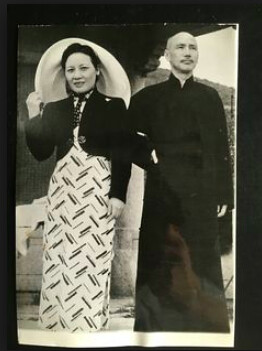 |
| Pantsless Chiang, a.k.a "Johnny No-Pants" |
Chiang is known to have famously said that "the sky is not big enough to burn with the brightness of two separate pant-legs."
SEE: Our gallery of world leaders wearing pants
Asked for their opinions, everyday Chinese Taipeiers expressed a range of strong views about Tsai's bold, pantsy choice.
"Actually, I don't care," said Taipei resident Chen Ya-ling. "I just hope President Tsai will be an effective ruler who listens to the voice of the Taiwanese people and decides rationally for the cou--hey where are you going?"
"Huh? What are you talking about? Who gives a damn? I want a president who is wise and measured in dealing with Taiwan's ailing econo---really? Just walking away because my opinion is not sensational enough?" added a noodle shop owner who asked to be referred to as Ah-xiong.
Clearly, ethnic divisions run deep in Chinese Taipei, a problem China says only it can solve through "national unity between China on both sides of the strait."
Renegade Taiwan Province has been governed separately from China since the two sides separated, or something, in 1949 because obviously they were exactly the same for a million years before 1949.
Labels:
no_really_just_pants,
pants,
politics,
tsai_yingwen
Tuesday, May 17, 2016
Ways Taipei Has Ruined Every Other City
Honestly, I feel like I've written something like this before, but after a bit of a search I couldn't find it. I've written about how a lot of people overlook all the stuff Taipei has gotten right, and it's street-level vibrancy and convenience actually, surprisingly, mirrors what I would call good urban planning. But that's not quite what I'm trying to say here.
There are just so many things that I've grown accustomed to, to the point of insisting on them, or taking them as a given, that it is now hard to imagine living in another city. I just don't see how another city could provide everything Taipei does. Let's have a look:
1.) The MRT
Me in another city:
"What do you mean there are no public restrooms?"
"What do you mean I can't have a free umbrella that someone left behind?"
"What do you mean the metro is closed because it's on fire?"
"I honestly do not understand why it took any more than 2 hours, let alone 2 years, to fix this escalator"
"Is that a mouse? Seriously WTF"
"Wait wait wait, you want me to either pay sky-high rent or live over a mile away from the nearest metro station? Why? Why would I do that?"
"You expect me to walk more than ten minutes to get to the MRT?"
Seriously, I live a bit closer to one MRT station on a less convenient line - maybe a 5-minute walk if you book it - and a little farther from one at a transfer station - maybe a 10-minute walk. I often moan to myself about taking the station a bit farther away because I so readily expect a 5-minute walk that a 10-minute walk feels like a real hassle. What am I, Walkie McWalkerson? The MRT should come to my door!
Now think about how I'd do in any major Western city!
2.) Breakfast and Coffee
I like to patronize those super unhealthy breakfast shops because I am too lazy to make my own breakfast more often than I'd like to admit. I like that if I'm in a rush they even have sandwiches waiting.
There are two of them within a 30-second walk of my front door.
But I believe in compromise. It's clearly too much to ask that any city have a place for me to live where a breakfast joint is 30 seconds away on foot. I'm willing to double that and make it a minute because I'm generous. The idea that if I want breakfast I have to walk for more than one minute, though? Blasphemy.
If you can't give me breakfast in one minute or less, your city is bad and you should feel bad.
The same is good for coffee. If there is a neighborhood where you can't get coffee within a short walk of your apartment, I don't want to hear about it.
3.) Other Food
A lot has been said about Taipei's culinary scene, I'll leave that be. Here's what I want to know about cities back in Western countries - what the hell is wrong with you that you think it's OK to charge that much for food? Don't you know I can get 10 potstickers for, like, a dollar fifty in a real city? And while I know Western goods are more expensive here, I have to laugh at prices back in the West for basic produce. Fresh cilantro, spinach, peppers etc. cost what now? Are you mad?
4.) Cheap rent
Growing up I always thought that if you wanted to live downtown you could, you'd just be in an apartment, and if you wanted a house you could spend the same amount and move to the suburbs. But outside any city I'd want to live in in the US (hint: I don't want a lifestyle based around driving, so that's, like, two cities, maybe three if I'm generous, the rest are not even on my radar because who even drives? Seriously), it feels like you can either rent an apartment in the suburbs, buy a house in the far exurbs and enjoy your 2-hour-each-way commute, or just not live in the city at all because who the fuck can afford that? What I would call reasonable downtown rent is now the rent expected in the 'burbs or outer boroughs, and the rent in cities themselves just isn't even a thing in this universe it's so unreal.
In Taipei I get 30 ping right downtown for less than $1000USD a month, and I have a doorwoman and elevator. Suck it, The West!
5.) Urban Driving
Already covered this. I know how to drive, I even have a license, but I don't do driving really. Not my thing. I put my money where my values are and take public transit. Most American cities require you to have your own vehicle - pretty much any city outside of New York, Washington DC (where you still actually do need a car if you want to get anywhere with any modicum of convenience), Boston and maybe Chicago, and all but one of those cities is still inconvenient without a car. I do not understand this because the whole point of being "urban" to me is that it, to some degree, equals "don't have to drive". Why would you build a city you have to drive in? What twisted or just plain stupid minds would ever think that's a good idea?
I mean if I had a job in DC like the one I do in Taipei there's no way I'd be able to get between clients without a car, and DC is considered to have "good" (ahem) public transit. I'm not sure why.
Does not make sense. I've got some subterranean homesick alien stuff going on with that.
6.) "I can't socialize, I'm broke!"
Wait, can't we just get some tai-pi and hang out in 7-11 then? Or I can take the MRT to your place 'cause that's a thing you can do in a real city? Wait, your city doesn't have that? You can't just hang in 7-11 and places require gas and a car to drive to? How do people socialize if they don't have money? They don't? WTF? How is that even a thing?
7.) 7-11 generally
To prove my point, I suggest that you go to a 7-11 in the US, in your buy a beer and some snacks in your pajamas (points if you try to do this at 3am and complain loudly when you realize the 7-11, which clearly needs to be open 24 hours, is not in fact open because there is no God), and sit in that 7-11 drinking your beer and eating your snacks, still in your pajamas. Maybe take a nap. See how long it takes for them to call the police.
In Taipei this is so common that I call it 'street soda' (beer on the street) and my sister calls it Bar 7.
You see? Taipei is better.
8.) Really, I am pretty sure those guys are trained for the zombie apocalypse
When the zombie apocalypse comes in the US, where you gonna go, chump?
I know where I'm gonna go. 7-11! Sure they have breakable windows but I am also fairly convinced that when the zombies attack the 7-11 superstar clerks will take out their 7-11 issued crossbows with cute little cartoons on them and just...take out the zombies. All part of the job. Then we'll drink beer and hang out in the 7 together. My treat, because I can afford it.
9.) The really pleasant lack of street rapists
No, seriously, when a single woman walks down the street after a certain hour (or not even after a certain hour!) in most Western cities, she's all "hey so where my rapists at? Because I know they're here". The threat of assault really is that bad in a lot of places, and there are quite a few you just don't go to alone at night if you are female. Certain areas where you do not walk. You definitely take great care in taxis, too.
I can't think of even one place in all of Taipei where I would not feel perfectly comfortable walking alone at any time of day or night, even down at the riverside park, even in the less-savory parts of town. I'm not saying rape doesn't happen - it does - but your chances of getting assaulted on the street are basically zero.
10.) When I am sick I can afford to see the doctor and I don't have to wait
This applies more to Americans (but plenty of other Westerners have to wait far too long for their health care). But what else is there to say? In the US even with health insurance I couldn't afford to see a doctor when I needed to. I was barely scraping by even on a salaried office job, so even though I had only a co-pay, I couldn't afford it. It was my bus fare for the next two weeks! Now if I'm sick I see the doctor.
This is related to living in a city because I can usually walk to any clinic I need. Even if I have to take transit it's not particularly far which is a big deal when your problem is immediate and serious, like bronchitis and every second you have to be out and walking around is like agony.
WOW! It's like the FIRST world! UNLIKE my home country!
11.) The speed of telecommunications
Putting this under 'city life' too because perhaps in smaller towns in Taiwan it's not quite the same. I love how in Taipei when I want to go online I just go online and things happen instantly. Slow wifi is a death sentence for a cafe, and slow wifi at home simply doesn't happen, because Taipei (at least) has taken the effort to upgrade all of its cables. None of this "well fiber optic cable runs to your building but inside your building you have copper wire from the 1920s so...enjoy your slow wifi bub". That's nonsense. We live in the first world. The FIRST world. America should try it sometime...
12.) When I want to leave...
...I can take a bullet train and be on the other end of the country* in 90 minutes
HAVE FUN ON AMTRAK SUCKERS
~*~zoom~*~
*none of this "island" nonsense, it's a country
There are just so many things that I've grown accustomed to, to the point of insisting on them, or taking them as a given, that it is now hard to imagine living in another city. I just don't see how another city could provide everything Taipei does. Let's have a look:
1.) The MRT
Me in another city:
"What do you mean there are no public restrooms?"
"What do you mean I can't have a free umbrella that someone left behind?"
"What do you mean the metro is closed because it's on fire?"
"I honestly do not understand why it took any more than 2 hours, let alone 2 years, to fix this escalator"
"Is that a mouse? Seriously WTF"
"Wait wait wait, you want me to either pay sky-high rent or live over a mile away from the nearest metro station? Why? Why would I do that?"
"You expect me to walk more than ten minutes to get to the MRT?"
Seriously, I live a bit closer to one MRT station on a less convenient line - maybe a 5-minute walk if you book it - and a little farther from one at a transfer station - maybe a 10-minute walk. I often moan to myself about taking the station a bit farther away because I so readily expect a 5-minute walk that a 10-minute walk feels like a real hassle. What am I, Walkie McWalkerson? The MRT should come to my door!
Now think about how I'd do in any major Western city!
2.) Breakfast and Coffee
I like to patronize those super unhealthy breakfast shops because I am too lazy to make my own breakfast more often than I'd like to admit. I like that if I'm in a rush they even have sandwiches waiting.
There are two of them within a 30-second walk of my front door.
But I believe in compromise. It's clearly too much to ask that any city have a place for me to live where a breakfast joint is 30 seconds away on foot. I'm willing to double that and make it a minute because I'm generous. The idea that if I want breakfast I have to walk for more than one minute, though? Blasphemy.
If you can't give me breakfast in one minute or less, your city is bad and you should feel bad.
The same is good for coffee. If there is a neighborhood where you can't get coffee within a short walk of your apartment, I don't want to hear about it.
3.) Other Food
A lot has been said about Taipei's culinary scene, I'll leave that be. Here's what I want to know about cities back in Western countries - what the hell is wrong with you that you think it's OK to charge that much for food? Don't you know I can get 10 potstickers for, like, a dollar fifty in a real city? And while I know Western goods are more expensive here, I have to laugh at prices back in the West for basic produce. Fresh cilantro, spinach, peppers etc. cost what now? Are you mad?
4.) Cheap rent
Growing up I always thought that if you wanted to live downtown you could, you'd just be in an apartment, and if you wanted a house you could spend the same amount and move to the suburbs. But outside any city I'd want to live in in the US (hint: I don't want a lifestyle based around driving, so that's, like, two cities, maybe three if I'm generous, the rest are not even on my radar because who even drives? Seriously), it feels like you can either rent an apartment in the suburbs, buy a house in the far exurbs and enjoy your 2-hour-each-way commute, or just not live in the city at all because who the fuck can afford that? What I would call reasonable downtown rent is now the rent expected in the 'burbs or outer boroughs, and the rent in cities themselves just isn't even a thing in this universe it's so unreal.
In Taipei I get 30 ping right downtown for less than $1000USD a month, and I have a doorwoman and elevator. Suck it, The West!
5.) Urban Driving
Already covered this. I know how to drive, I even have a license, but I don't do driving really. Not my thing. I put my money where my values are and take public transit. Most American cities require you to have your own vehicle - pretty much any city outside of New York, Washington DC (where you still actually do need a car if you want to get anywhere with any modicum of convenience), Boston and maybe Chicago, and all but one of those cities is still inconvenient without a car. I do not understand this because the whole point of being "urban" to me is that it, to some degree, equals "don't have to drive". Why would you build a city you have to drive in? What twisted or just plain stupid minds would ever think that's a good idea?
I mean if I had a job in DC like the one I do in Taipei there's no way I'd be able to get between clients without a car, and DC is considered to have "good" (ahem) public transit. I'm not sure why.
Does not make sense. I've got some subterranean homesick alien stuff going on with that.
6.) "I can't socialize, I'm broke!"
Wait, can't we just get some tai-pi and hang out in 7-11 then? Or I can take the MRT to your place 'cause that's a thing you can do in a real city? Wait, your city doesn't have that? You can't just hang in 7-11 and places require gas and a car to drive to? How do people socialize if they don't have money? They don't? WTF? How is that even a thing?
7.) 7-11 generally
To prove my point, I suggest that you go to a 7-11 in the US, in your buy a beer and some snacks in your pajamas (points if you try to do this at 3am and complain loudly when you realize the 7-11, which clearly needs to be open 24 hours, is not in fact open because there is no God), and sit in that 7-11 drinking your beer and eating your snacks, still in your pajamas. Maybe take a nap. See how long it takes for them to call the police.
In Taipei this is so common that I call it 'street soda' (beer on the street) and my sister calls it Bar 7.
You see? Taipei is better.
8.) Really, I am pretty sure those guys are trained for the zombie apocalypse
When the zombie apocalypse comes in the US, where you gonna go, chump?
I know where I'm gonna go. 7-11! Sure they have breakable windows but I am also fairly convinced that when the zombies attack the 7-11 superstar clerks will take out their 7-11 issued crossbows with cute little cartoons on them and just...take out the zombies. All part of the job. Then we'll drink beer and hang out in the 7 together. My treat, because I can afford it.
9.) The really pleasant lack of street rapists
No, seriously, when a single woman walks down the street after a certain hour (or not even after a certain hour!) in most Western cities, she's all "hey so where my rapists at? Because I know they're here". The threat of assault really is that bad in a lot of places, and there are quite a few you just don't go to alone at night if you are female. Certain areas where you do not walk. You definitely take great care in taxis, too.
I can't think of even one place in all of Taipei where I would not feel perfectly comfortable walking alone at any time of day or night, even down at the riverside park, even in the less-savory parts of town. I'm not saying rape doesn't happen - it does - but your chances of getting assaulted on the street are basically zero.
10.) When I am sick I can afford to see the doctor and I don't have to wait
This applies more to Americans (but plenty of other Westerners have to wait far too long for their health care). But what else is there to say? In the US even with health insurance I couldn't afford to see a doctor when I needed to. I was barely scraping by even on a salaried office job, so even though I had only a co-pay, I couldn't afford it. It was my bus fare for the next two weeks! Now if I'm sick I see the doctor.
This is related to living in a city because I can usually walk to any clinic I need. Even if I have to take transit it's not particularly far which is a big deal when your problem is immediate and serious, like bronchitis and every second you have to be out and walking around is like agony.
WOW! It's like the FIRST world! UNLIKE my home country!
11.) The speed of telecommunications
Putting this under 'city life' too because perhaps in smaller towns in Taiwan it's not quite the same. I love how in Taipei when I want to go online I just go online and things happen instantly. Slow wifi is a death sentence for a cafe, and slow wifi at home simply doesn't happen, because Taipei (at least) has taken the effort to upgrade all of its cables. None of this "well fiber optic cable runs to your building but inside your building you have copper wire from the 1920s so...enjoy your slow wifi bub". That's nonsense. We live in the first world. The FIRST world. America should try it sometime...
12.) When I want to leave...
...I can take a bullet train and be on the other end of the country* in 90 minutes
HAVE FUN ON AMTRAK SUCKERS
~*~zoom~*~
*none of this "island" nonsense, it's a country
WILDLY SPECULATING about the lack of women in the Tsai cabinet
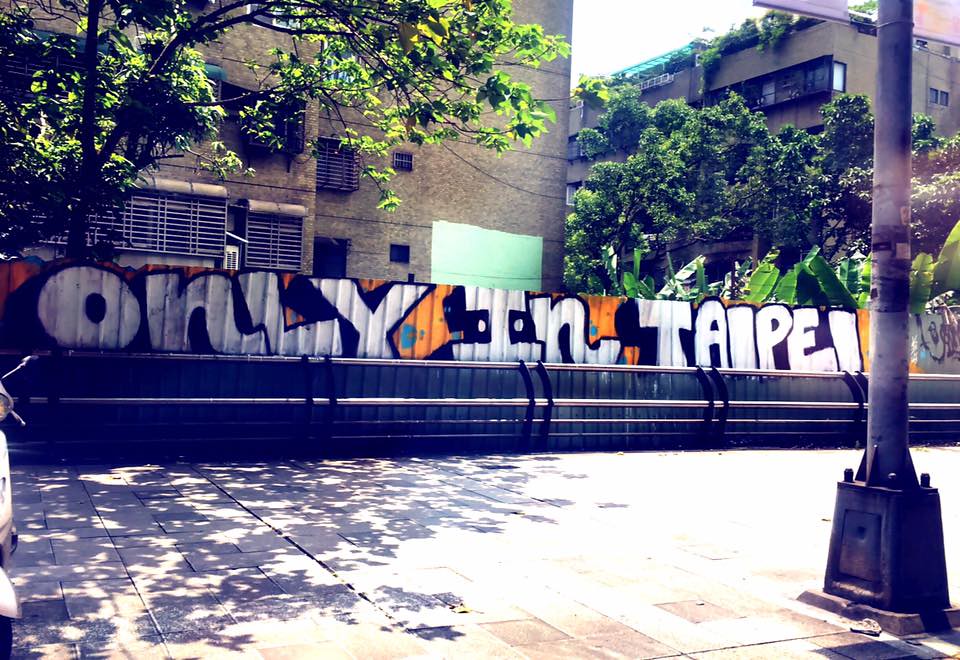
Please enjoy this random photo I took that I happen to like
The difficult thing about trying to have something of a niche in the Taiwan blogging world is that sometimes you don't necessarily have a lot to say about the latest news in your niche other than "well that sucks".
I mean, I could try to salvage a bright side and note that when the highest office in the land is occupied for a woman, that's a victory no matter what, but I'm not feelin' it and you probably aren't either. We do expect more, for good reason.
It happened with Hung Hsiu-chu's short-lived candidacy and it's happening again with the Tsai administration's new "no girls allowed" cabinet, which people are pointing out mostly because, as Taiwan's first female president, they expected a little more gender equality in said cabinet because they expected an administration to be sensitive to such things (if President Ma had a cabinet with very few women, many people would probably just chalk it up to Ma being an asshat and be done with it).
Can I just note in that podcast, which starts talking about gender imbalances at about the 28-29 minute mark, I was a little annoyed by a female speaker call it the worst "Mother's Day present to women"? Not all women are mothers. What does Mother's Day have to do with women generally? Not much.
All I really have to say is "well that sucks"- and the cabinet overall, in terms of age and education, also kinda sucks.
Of course, from my memory of the Tsai campaign, although the first time around I came across stickers and other promotional materials touting her as "Taiwan's first female president" in the 2012 campaign she lost, I just don't remember seeing much about her campaigning specifically on that idea or drawing attention to her gender much at all. Certainly I don't remember her promising a gender-equitable cabinet.
Or did she, and I just missed that? Please do remember I spent a huge chunk of 2015 in the US for family reasons, and returning I was so busy I didn't have time to catch up on the political scene, so I missed a lot. If so, it's a straight-up broken promise.
But, then again, maybe I didn't miss anything. It seems to me her gender, and not her words, created that expectation and when she went and acted like any ol' politician with a penis, it was that expectation, the ones we created, that were dashed. I'm not sure she herself gave any indication that she would specifically be a force for gender equality beyond being a woman herself. The podcast says something like "we expected she could break the glass ceiling for all women", but did Tsai ever say she was going to do that, make an effort on that or focus on that?
I'm genuinely asking, because, as I said, I wasn't here for much of 2015 and paying more attention to family than Taiwan.
That's not meant as a defense - I happen to think any presidential candidate regardless of gender should have a gender equitable cabinet. Tsai is not exempt from that because or despite the fact that she's female. While I would hope a president who understands the obstacles women face just for being women would be more sensitive to the issue, I hold male politicians just as accountable.
Well, I say that, but I didn't write any of this when Ma was elected and re-elected, even though (while Tsai's cabinet has an even bigger gender imbalance) it's not like the Ma administration was this huge pro-women revolution or seemed to care much about women's representation in government. So maybe I'm a hypocrite.
I'm not sure why, and while a lot has been reported on it, nobody else seems to really know why either. I haven't heard much in the way of reasons for this, even in the podcast where there is criticism, and dismay, but almost nothing deeper, nothing in the way of analysis for how this happened - perhaps because nobody knows.
But not knowing never stopped me from shooting off my mouth before, so I'll speculate wildly and inexpertly because what the hell.
1.) Edited to add: the most obvious possibility, which I didn't really consider because (thanks to my own biases) I just sort of assumed Tsai would have a strong hand in who went into the cabinet. But, she may well have just rubber-stamped Lin Chuan's choices. I didn't really consider this one because I assumed (possibly wrongly?) that if Tsai is ultimately appoints the cabinet that the final responsibility and blame for who is in that cabinet rests with her (also I tend to ignore Lin Chuan because I feel like he's setting himself up to do a bad job...perhaps I just wish he didn't exist?). Or perhaps - despite my earlier claim to try and not have any biases and to hold male and female elected officials equally accountable for gender parity in government, in fact I did automatically lay blame on the woman rather than the (can I say kind of terrible? Is it too early for that? I really don't like him) man.
2.)As a former policy wonk without much executive experience, perhaps she just didn't think this one through. That sounds lightweight, but in fact it's pretty damning. A good leader must think these things through.
3.) As a woman fighting against an overwhelmingly pro-man, anti-woman sexist system, perhaps she has developed a mindset in which, well, she acts like the men around her. It's not that uncommon, especially for women in power, to try to secure and establish their positions by, at times subconsciously, acting and thinking more like the men around them. Not because it's particularly natural for women to follow men (it's not) but because it's natural for people to want to fit into their environs, and when the environment is such a damn sausage fest, perhaps you start to think like you have some sausage yourself.
4.) Perhaps, unlike the somewhat unconscious 'gotta fit in, gotta think like them' mentality above, this is a conscious effort to take emphasis off her gender and establish herself as an authority, to even maybe distance herself from 'women's issues'? Like "they'll all expect me to be 'women this and women that' rather than listening to me on the 1992 consensus, the Senkakus, international organization participation, the economy and more so I'll cut that off early by not showing women any special consideration." If so, it backfired spectacularly!
5.) Some combination of (4) and (5) or landing somewhere in between has led her to a slightly askance viewpoint in which insisting to the point of going beyond logic that only credentials matter and gender never does - which of course is true, or is true in a perfect world, but as this points out (in Chinese), so often 'gender doesn't matter, only credentials matter, if the most qualified people are men then the majority of the cabinet will be men' is taken as a launch point not to fight for greater equality because credentialed people exist in diverse and less-privileged populations, but to keep the patriarchy firmly in place and let the system run as usual.
Seeing as previous cabinets (under men!) had more women than this one, clearly women with the right credentials exist. This cabinet could have been more gender-equal. Saying "well they got the most qualified people they could and they happen to be men" papers over that with, well, illogic and falsehood.
Also worth noting is that this can't possibly be the 'most qualified cabinet' to run Taiwan as it exists today: a country that is finally starting to listen to its youth. When the average age of your cabinet is closer to my father's than it is to mine (and I'm not particularly young though I like to pretend otherwise) in a country where student activists are a big effin' deal, then your cabinet is not qualified to properly represent the country.
(I'm not quite as worried about the lack of PhDs compared to previous cabinets, in part because I don't think education is necessarily the only way to become a great statesperson, in part because Taiwan already has a lot of respect, and quite a few, very highly educated people making high-level decisions - they do love their scholar-leaders - and in part because we all remember what happened when MENSA tried to run Springfield).
Though that brings me to a pretty solid silver lining that my previous contemplations failed to provide: at least the public discourse surrounding this issue is pretty solid in Taiwan. Taiwan civil society for the win! I'm not sure I'd expect discourse like this to be the rule rather than the exception in many other countries (I thought of Asia when I said that but I have to be honest - including my own. The USA is full of man-children).
So, I guess I'll end on that.
Come on Tsai. Do better.
Sunday, May 15, 2016
The protest that wasn't, the narrative that isn't
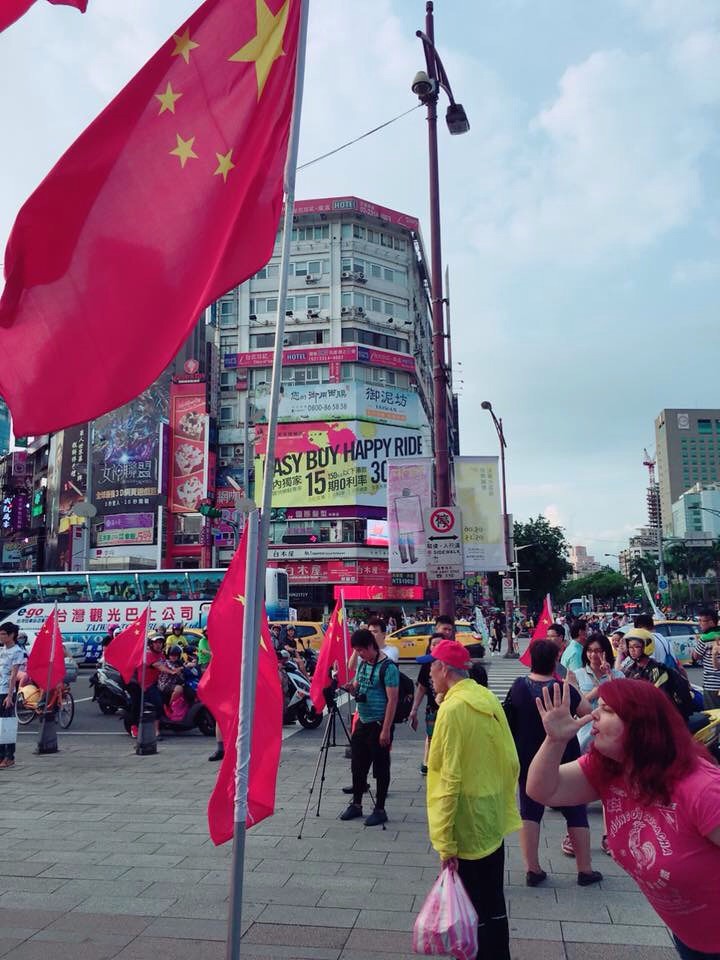
So you know how Taiwan independence demonstrators are so often found in Ximending on the corner near Red House? Well, today a bunch of pro-China supporters got permission to use that space - they had tents and a police presence and everything - to set up a bunch of Chinese flags and a loudspeaker blasting pro-China songs and rants about how if Taiwan insists on Taiwan independence, then "there will be war, missiles will reach Taiwan in just 7 minutes, Tsai Ying-wen had better take heed and recognize 'one country two systems'" followed by more bellicose patriotic songs.
Video is from Taiwanreporter - I took some videos too and will put them online soon, for now this one is fine. In fact he got a lot of the same people on camera as I did, including the person saying "Taiwan Number One". Watch through and note the reactions of bystanders. Who does it look like they support?
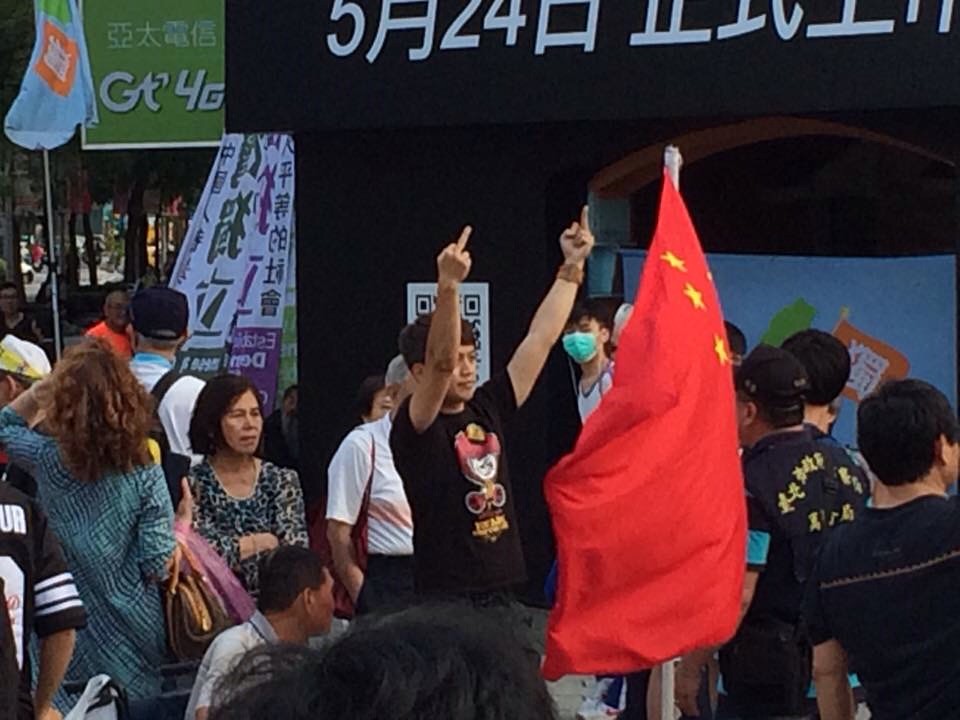
This guy is my hero!
Photo by my friend Ellery Hamann
My first thought was that these were protesters from China, which should absolutely not be allowed. But, no, with police protection and all the trappings of a legit protest, they were almost certainly Taiwanese citizens who just happen to have douchey opinions.
In fact, as Taiwanreporter pointed out, they are (almost certainly) the same folks who until recently protested and try to create trouble around Taipei 101, until Mayor Ko put a stop to it.
That's not a reason to deny anyone freedom of speech, of course, and they have the right to do this in public as much as, say, any of us have the right to demonstrate for Taiwanese sovereignty. I'm also not going to join the calls to 'deport them back to China' because, well, they are citizens too. I'd love to deport Ted Cruz to Canada but he is as much an American as I am. Every country has its jerks. But, I can't help but wonder if they'd be happier in China, and if they love it so much, why don't they just move there of their own accord? Why do they have to cramp our style, insisting on a political solution that will never be acceptable to Taiwan, when the majority is just not with them and never will be?
So my second thought is that they were paid. And they almost certainly were - I highly doubt this is just a spontaneous display of love for China. That's just not in the national. attitude right now and honestly, hasn't been...well, ever. Even the "we will force you to. Be Chinese, we are better than you because we come from China so we'll murder everyone who disagrees with us and stamp out your cultural touchstones" KMT fucklords weren't pro-PRC. until recently, and even now they wouldn't dare be so open about it. Almost no doubt about it - these guys were paid by China to stir up trouble in the run-up to Tsai Ying-wen's inauguration and provide a colorful backdrop that China can refer to when trying to make the dubious claim that some Taiwanese support "reunification" (heh).
It happens a lot in Hong Kong - on important days or on days when there are pro-Hong Kong demonstrations, pro-China counter-protesters show up too, and they are almost always paid. Whether or not they are sincere is almost beside the point - if the government has to pay them to protest, then they are not acting in good faith vis-a-vis public discourse. This is also in part for photo ops that Beijing can shop around to show that some Hong Kongers 'want to be a part of the PRC'.
Not to get too conspiracy theorist but seeing as it was in part an anti-Tsai protest, I have to wonder how much they were encouraged or 'allowed' by the KMT. Remember, as much as we'd all like to forget, Ma Ying-jiu is still the president.
So why am I writing about them? Why am I giving them air time? They may have the right to protest but they don't have the right to be paid attention to, yes?
Yes! But.
I wanted to point out two things. The first is that there are almost no actual protesters there! Take a close look at the photos once they are posted. There is one guy in a vest, a woman with a sign and an old guy waving a big flag (who looks suspiciously similar to the driver of the Musical China Douchemobile - and probably is. It's like the same four people at every protest, because China couldn't even get more than that with money). There may be a few others in the tents hiding from public view. All that sound and fury is coming from a LOUDSPEAKER! They're no better than some stupid recording blaring about discounts on Panadol outside of a Watson's or Cosmed. There are a few flags, a loudspeaker and a couple of people.

Look! There's nobody actually there!
Perhaps it was because the Chinese government perhaps could not find enough people who would even do this for money in Taiwan who could do so legally. Wouldn't surprise me if that were the case. There are maybe three or four people in all of Taiwan who support unifying with the PRC, and the same three or four people show up at every paid protest with flags and loudspeakers to create some sound and fury, to seem bigger and more important than they are.
What amuses me is that unless these photos are strongly photoshopped, with people added in, or cropped creatively, they actually make China look worse - you can't even get a person to sing that dumb Chinese song? You have to use a loudspeaker? You can't get more than less than half a dozen people? What does that prove? How does that make China's case? It doesn't - it shows the opposite.
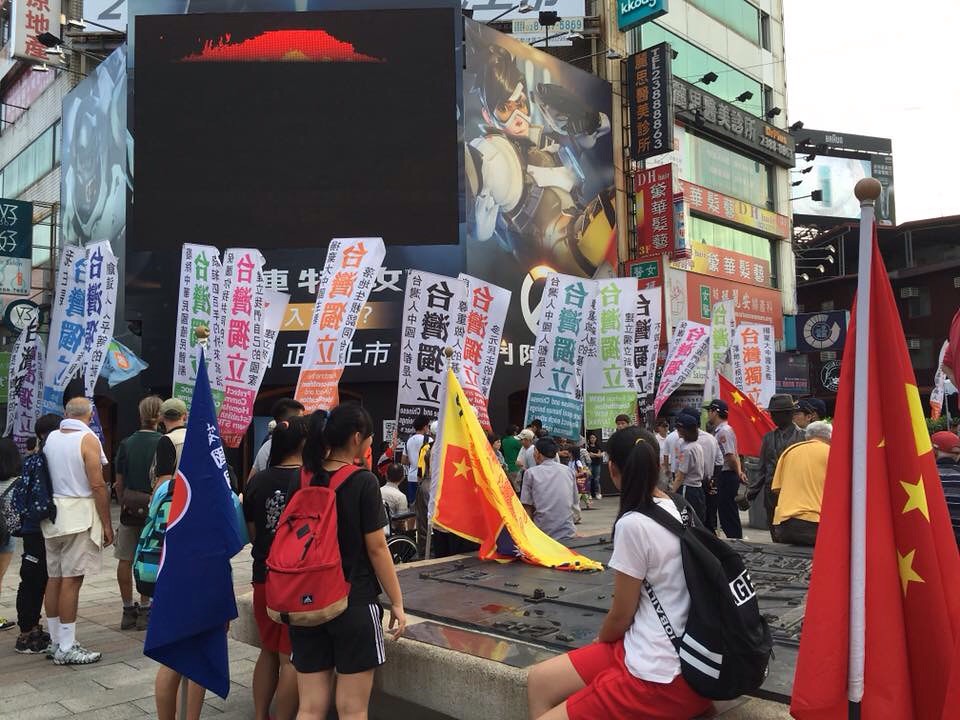
But there sure are a lot of people counter-protesting.
Perhaps it was because the protesters knew that they would not get a lot of support from passers-by, or any support really. They knew that if they showed their faces they'd get booed or laughed at, so they didn't show their faces for the most part. That is, of course, if more of them exist than were present earlier today.
This part really gets me - if you have a douchey opinion, fine, as long as it more or less lines up with facts you have the right to it (you do not have the right to be right about it, though). But if you're going to set up a street protest to express it, at least have the balls to show up in person. What kind of dickless wonders take Chinese money, then hang up a few flags, set up a loudspeaker and won't even show their coward faces? Absolutely no sympathy, no respect for that. I've got bigger balls than these guys. I may be a foreigner, but at least I'm willing to say, from my own mouth and in person, what I think (yes, foreigner residents to have the right of assembly in Taiwan - we can protest legally as long as we are legal residents and not undocumented or tourists). Christ. Grow a pair.
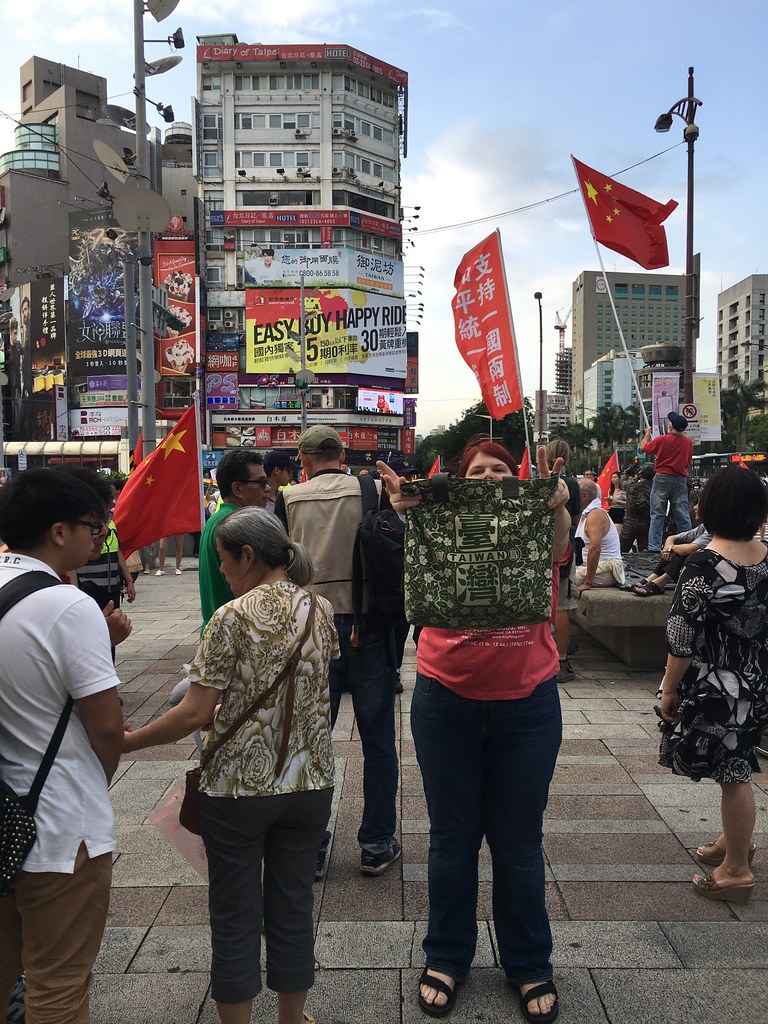
And protest I did, though I look tired and haggard today which is why I partially hid my face
If they can protest, so can I!
Also worth noting is that not only were bystanders not supportive at all - lots of middle fingers, lots of shouting back, lots of making fun of these guys, I quite literally did not even see one person walk by and actually support this in any demonstrable way - but that the counter-protest (remember, the pro-independence guys usually have this corner) was exponentially larger than the laughable shell of a pro-China protest (it's not hard to have more people than a protest of three). The counter-protesters had at least several dozen people, seemingly more walking around (they'd sit, march around etc.)
All this goes to show that not only have things changed in Taiwan, but that China can't even drum up enough people for a real demonstration nor will they ever garner enough support from the Taiwanese public. Taiwanese civil society is just not on the same page as the Chinese government or even the KMT, and while the latter may change (pendulums do swing), the former never will. China has lost this one.
They have nothing. They have no soft power in Taiwan - the Taiwanese hate their government and don't want to be a part of their country. They have no supporters. They have no path to "peaceful unification". They have nothing but empty photo-ops - a few flags and a loudspeaker. They are nothing. Their words mean nothing. They never even had a grip on Taiwan to lose. Like this protest, their words on Taiwan are are hollow. Meaningless, because they have zero - zero - support in a country where support matters.
I can't help but also notice that, while these guys were once aggressive outside Taipei 101, punching those who disagreed and counter-protesters and trying to start fights, that they now seem almost cowed. One woman quietly holds a sign. The old guy waves a flag. Someone in a vest stays well behind the police line. They know they don't have the high ground, local support or even political support to start fights anymore. They bluster and bloviate and wave their flags, but look a little closer under all that sound, they are cowed.
They may talk of "peaceful unification", but that will never happen. That battle is already lost (and China is the loser). China doesn't want war - I still think they don't, anyway - but it is simply not going to get Taiwan any other way but by looking like the bratty little fascists they are to the rest of the world and forcibly annexing a developed, democratic country. All that talk of "peaceful unification" is, like this "protest", an empty shell. Meaningless. Sound and fury, signifying nothing. A few loud people who do not speak for the vast majority of Taiwanese. It can't be peaceful if the Taiwanese don't agree to it, and they never, ever will. Won't happen, can't happen. Fuck you, China. You lose. Taiwan doesn't want you, they never have and they never, ever will. Eat me.
Monday, May 9, 2016
Something Old, Something New
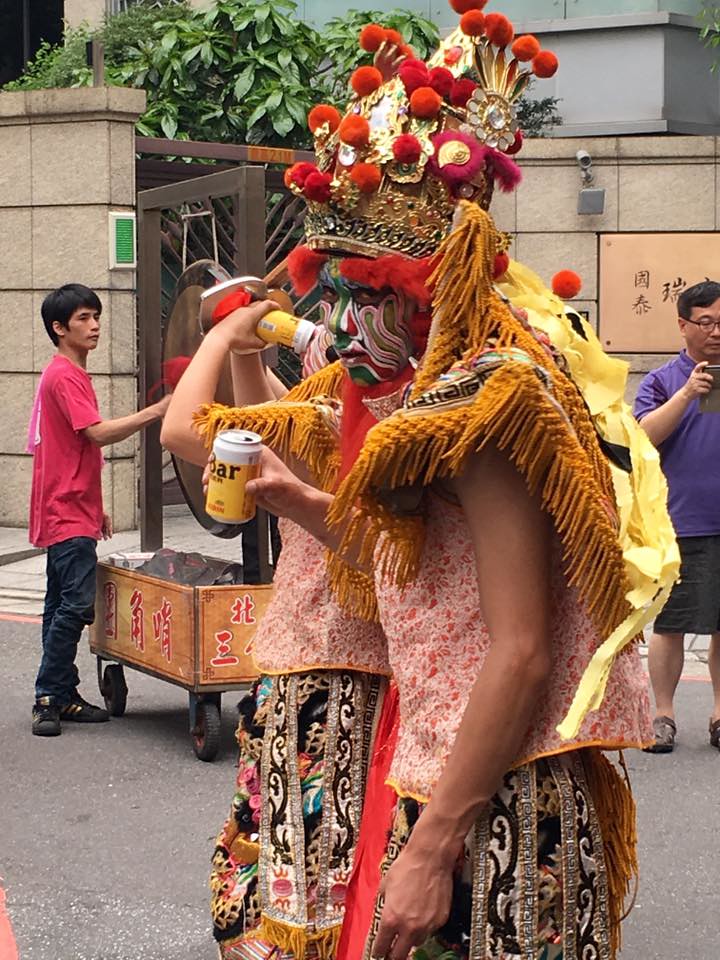
One of the things I love about living in Taiwan - though I suppose this is true for expat life in just about any country - is that I can see something that looks as though it will be the same as something I've seen in the past, but discover something completely new within it.
For example, I happened upon a temple parade in my neighborhood a few weeks ago. It is fairly rare to find one there; they usually take place in the older part of the city, not the most densely populated part of Da'an! I enjoyed it in part because, being more of a neighborhood thing, it didn't draw the massive crowds that the more well-known festivals draw. I was able to get solid close-ups of the temple cohorts and performers, including some more unique or characterful shots that are hard to get when you are pressed in by a massive crowd at, say, Qingshan Wang, Baosheng Culture Festival, the Matsu pilgrimage or others.
The other thing I liked about this festival was that I saw something I'd never seen before, despite having thought I'd "seen it all" as far as temple parades go.
And that is the offering of beer to bajiajiang, or the 8 generals!
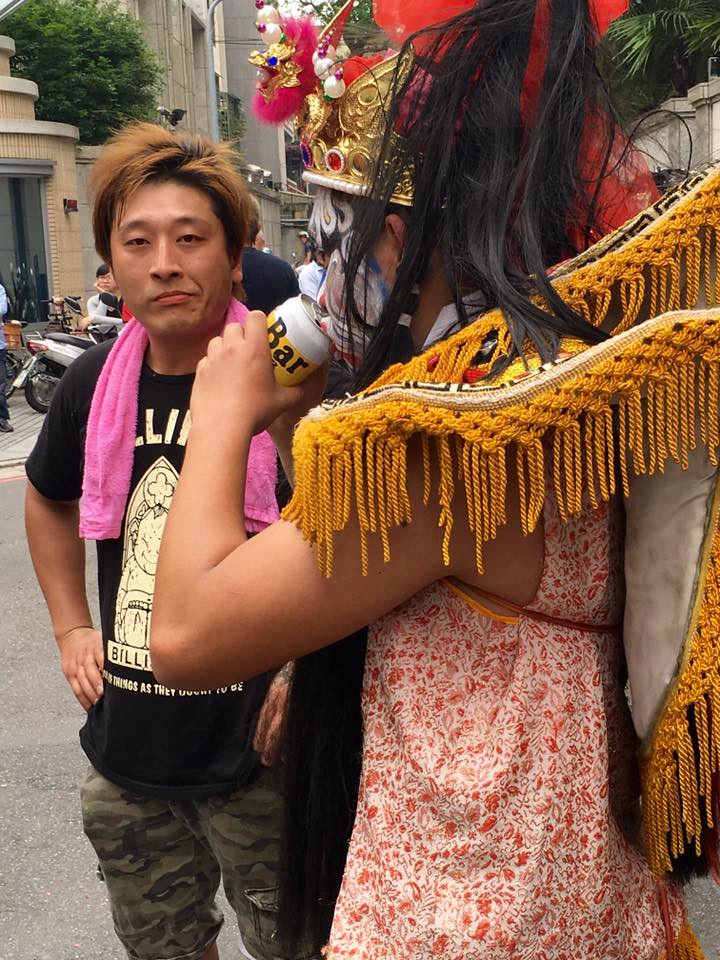
This was really interesting to watch - a tiny temple, more like a shrine, in the lanes around Rui'an Street, coming out with a tray of Bar Beer and offering it to the performers. The performers accepted it formally and drank it quickly.
I didn't know this was something you could do, in fact, I wasn't aware they could be seen drinking, talking or using technology (though I have definitely seen bajiajiang chatting, smoking or on cell phones when they shouldn't be.
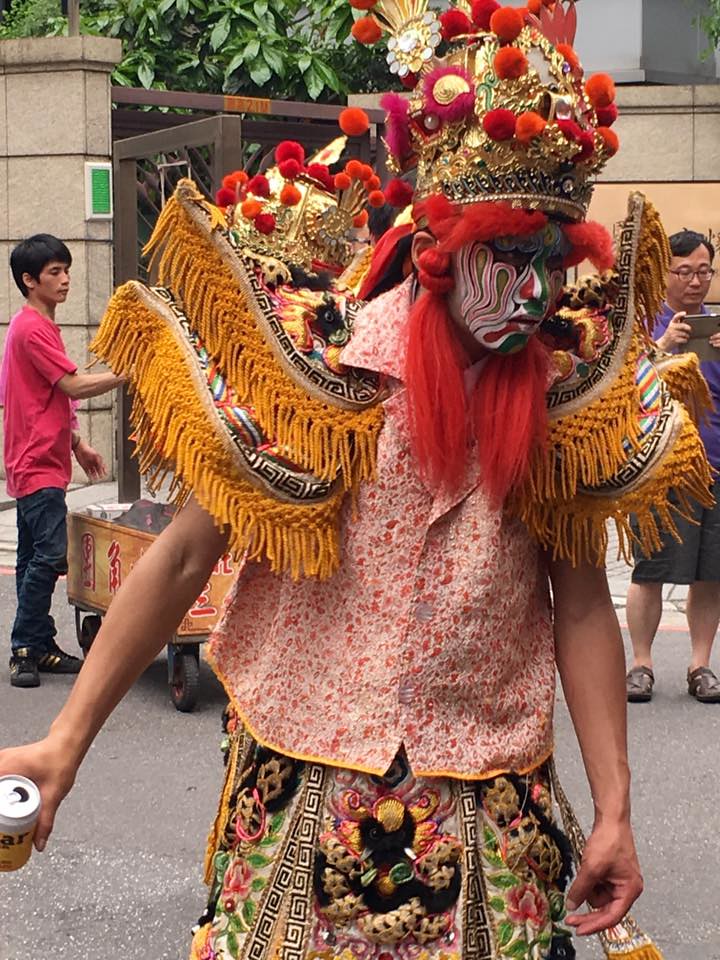
Another thing I didn't expect was the "temple parade enthusiast" (which I joked might be me in about 30 years) - I had seen spirit medium type parade followers who became possessed during parades but never one who was clearly not possessed but simply wanted to also be a part of the procession. She even had the right outfit, and was allowed to join by the rest of the temple troupes.
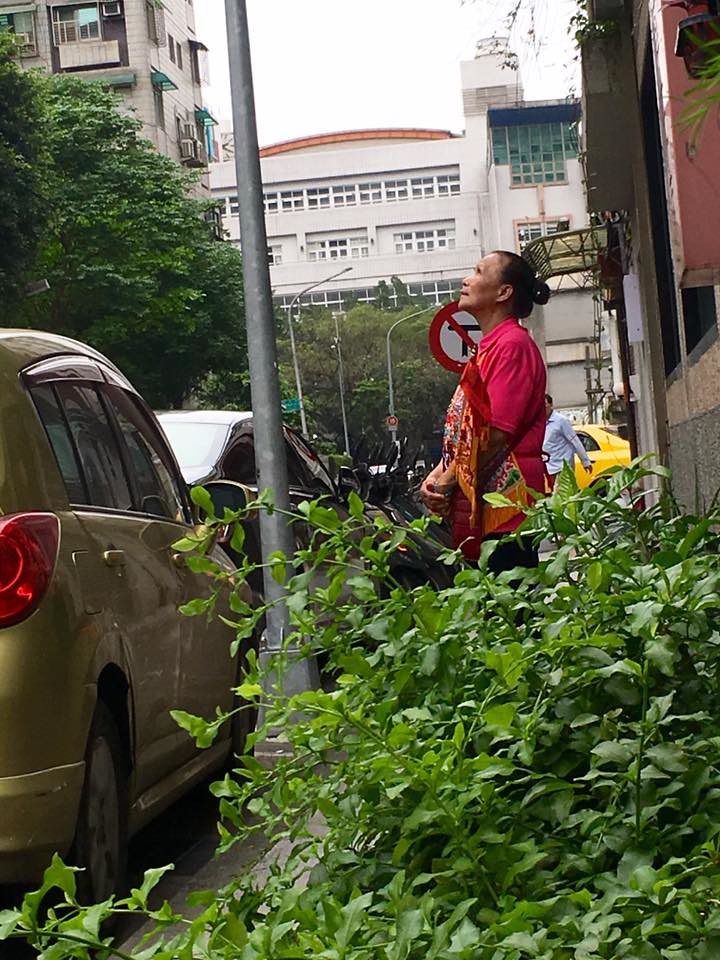
I was quite sad to see a truck with poles for sexy temple dancers being used for Three Princes (santaizi) instead, and none of them were dancing on the poles. A pole-dancing child god would be a wonderful photo!
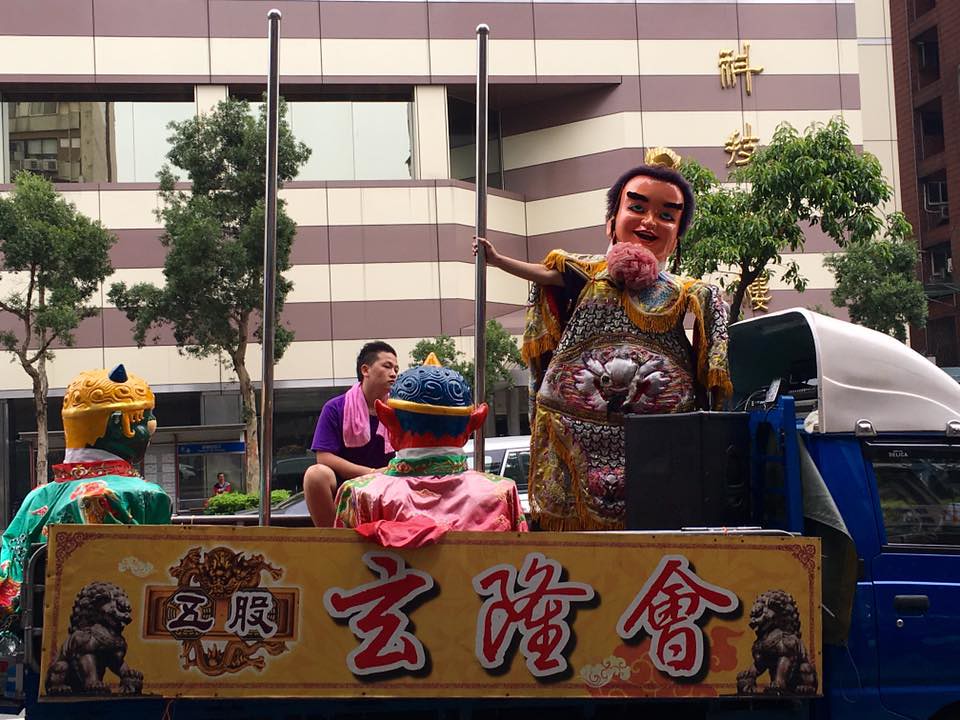
Otherwise it was a fairly normal neighborhood parade, with small crowds coming out to watch, not unlike, say, a Firemen's Day parade in the US but more colorful and interesting, at least to me. There were two bajiajiang troupes, the second fiercer than the first. These guys were legit scary:
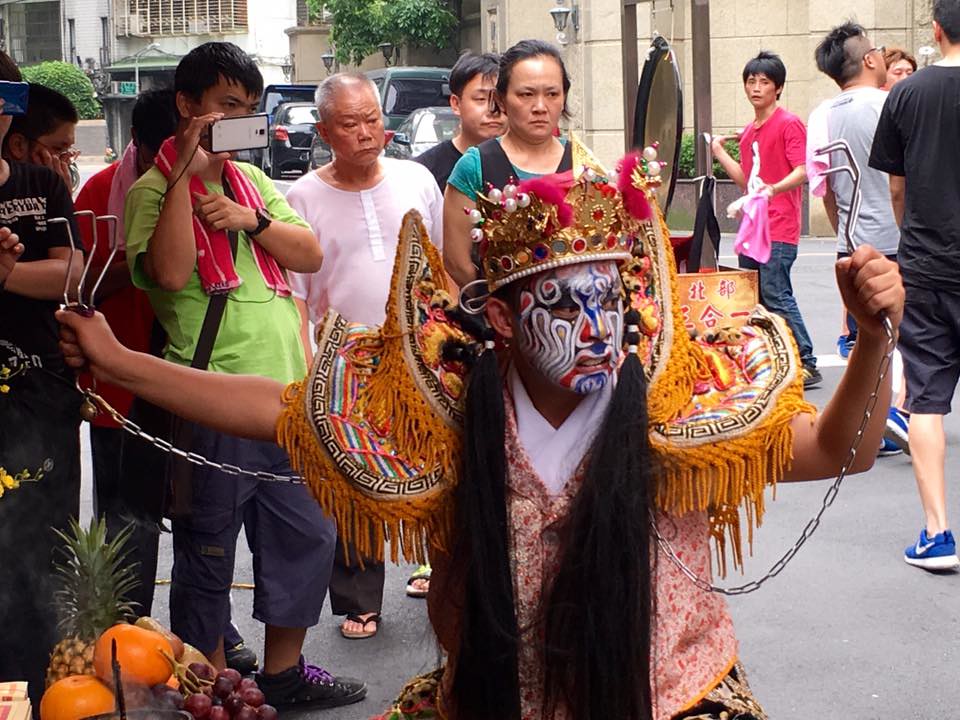
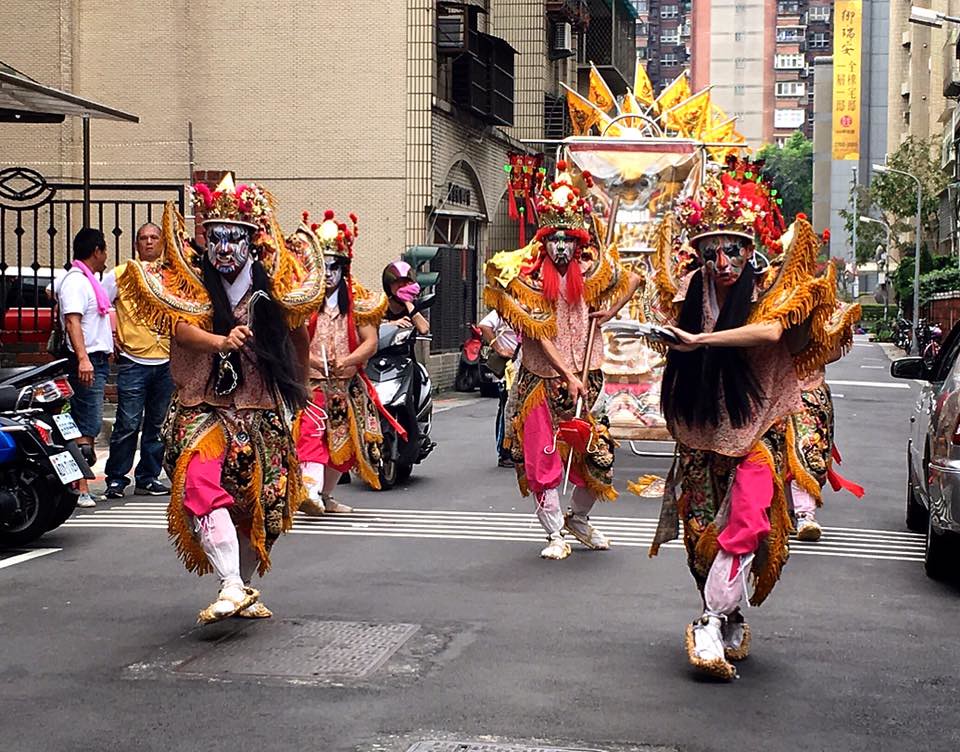
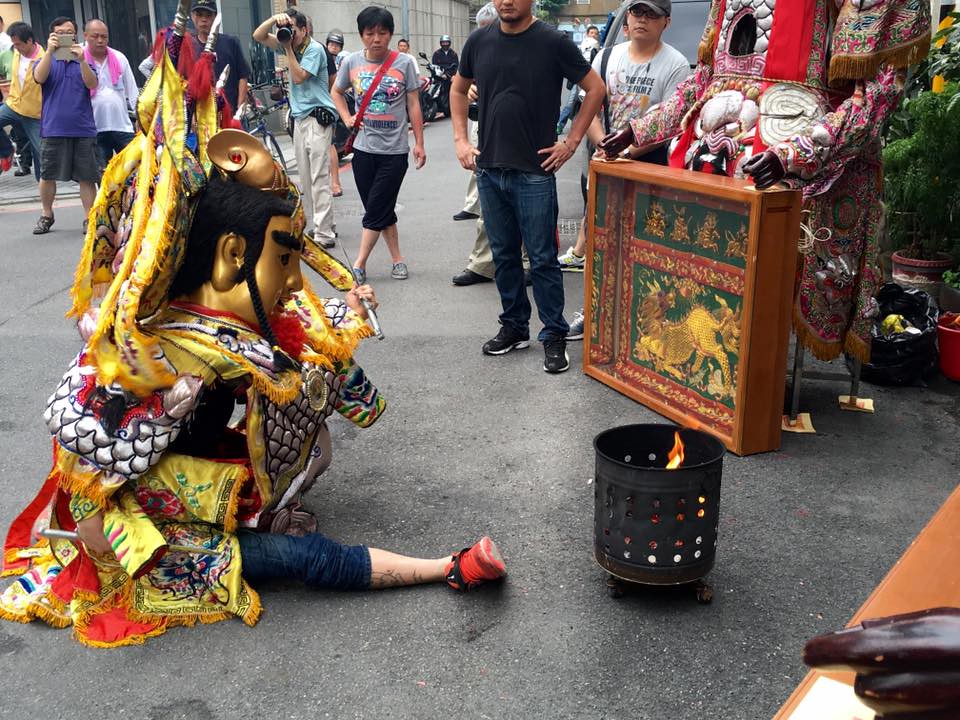
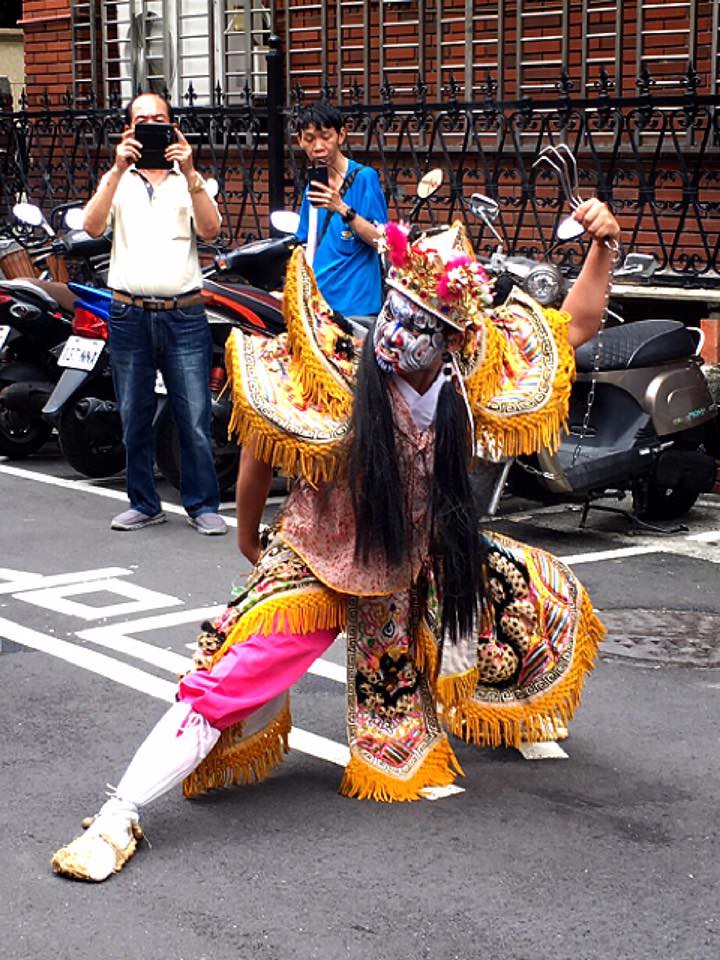
And the usual cohort of dragon dancers, lion dancers and tall god costumes.
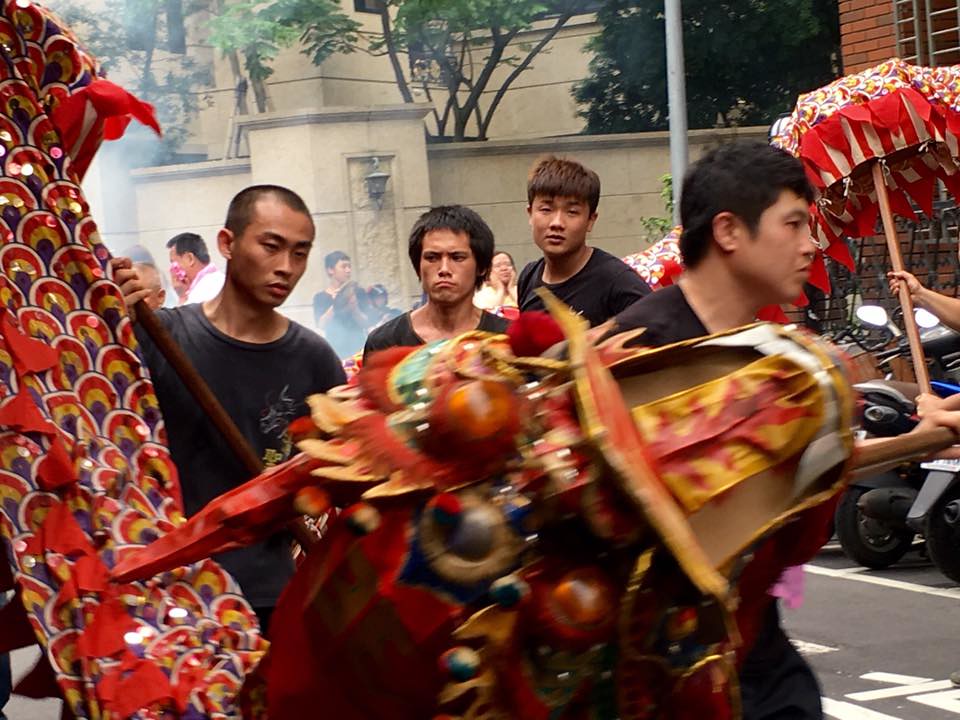
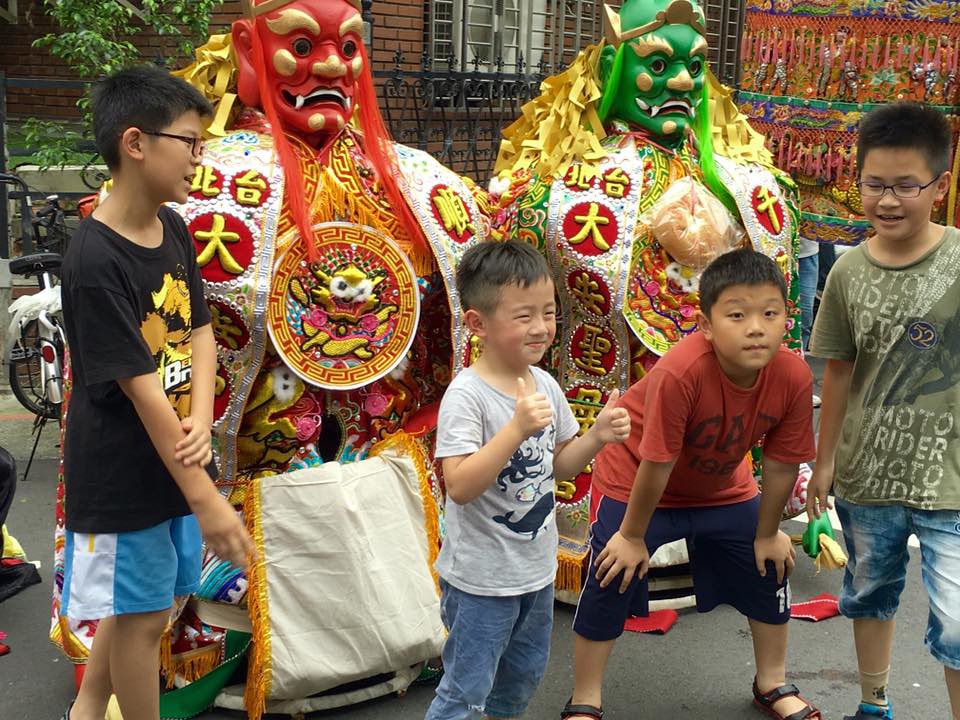
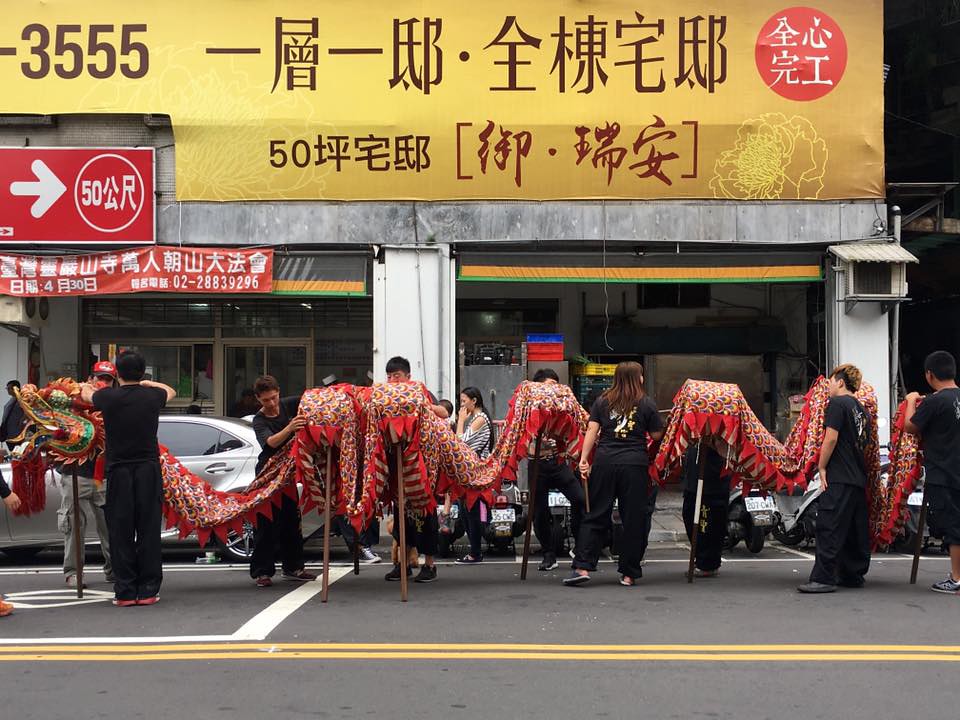
What bothers me, and I feel like writing about here, are complaints about traditional temple activities and how they should be curtailed or banned. Not just temple parades but ghost money, Mid-Autumn Festival barbecue and Chinese New Year firecrackers.
People complain that they are noisy, they are dangerous, they pollute, they annoy neighbors. I have very little patience for this (maybe for the ghost money but honestly the most polluted days to me are not the ones on which it is being burned). People who think the occasional temple parade causes "pollution" don't seem overly concerned about the actual biggest source of noise and air pollution in Taipei - scooters. Or how they are far more dangerous than a few fireworks from a parade.
They say Mid-Autumn Festival BBQ annoys neighbors, without even thinking about how noise trucks, those stupid loudspeakers outside of stores, or community events (Fireman's Day is a big one in my community, and there are quite a few concerts and children's events too) that are just as noisy and maybe just as annoying to some of us. But no, a few days of barbecue is somehow more polluting than Taipei's traffic, and somehow noisier and more annoying than all the other events in the city.
Give me a damn break. I just can't take seriously the idea that temple parades are somehow worse than scooters for traffic snarls, noise, air pollution or general danger and public annoyance, that Mid-Autumn BBQ is worse than a political noise truck or more polluting than the imprint of a large, air-conditioned, concrete department store, that Chinese New Year fireworks are more annoying than the Musical China Douchemobile. That ghost money smoke creates more pollution than factory or traffic exhaust (again, the worst pollution days to me - someone with a weak respiratory system - are actually not ghost money days).
So stupid. So wrongheaded.
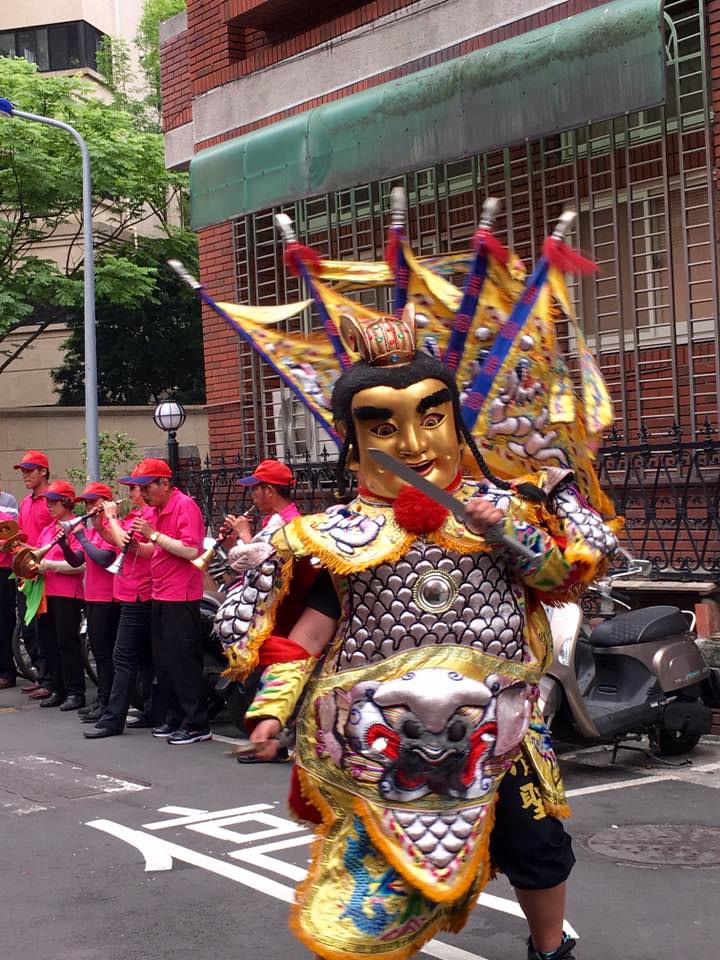
I'm usually not one go to in for conspiracy theories, but I can't help but wonder in whose interest it is to slowly let the air out of the cultural street life of Taipei (and Taiwan in general, but this seems to mostly be a Taipei problem). Whom does it benefit to see temple parades become smaller, quieter and more rare until they disappear altogether? Whom does it benefit to squash autumn barbecues? Whom does it benefit to allow noise trucks and civic events but not firecrackers? Whom does it benefit to ban or discourage election posters so Taipei looks less like a democracy going through an election as you drive around?
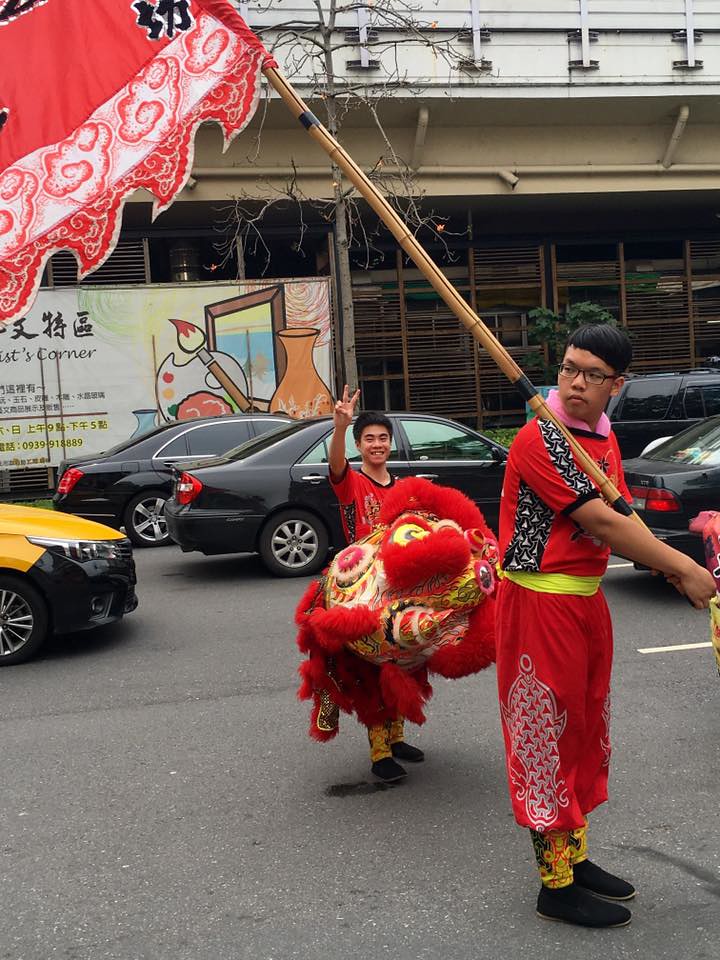
Because it seems to me that while temple parades may have originated in China, they aren't really done much in China anymore (one year in China and I saw exactly one lion dancer, hired for the grand opening of a supermarket), and a lot of the quintessentially "Taiwanese" practices, such as bajiajiang, have their origins in a few temples in Fujian and aren't really pan-Chinese in any real sense of the word. I didn't see much ghost money burning in China either although it originated there and I am sure is still practiced to some extent. The others, such as barbecue (which originated in Taiwan with a barbecue sauce ad, but I still love it and anyone who doesn't can shove off) and, well, democracy, are not Chinese in origin at all. Night markets may be a thing in some parts of China - I went to an okay one in Yantai - but most people associate them with Taiwan...and a lot of neighborhoods have become recently and mysteriously interested in closing down night markets in their vicinity where no such animosity existed before.
Is it an attempt, consciously or not, to make Taiwan look more like China?
I don't know, and I realize I'm baiting conspiracy theory by even asking, but that's sure how it feels.
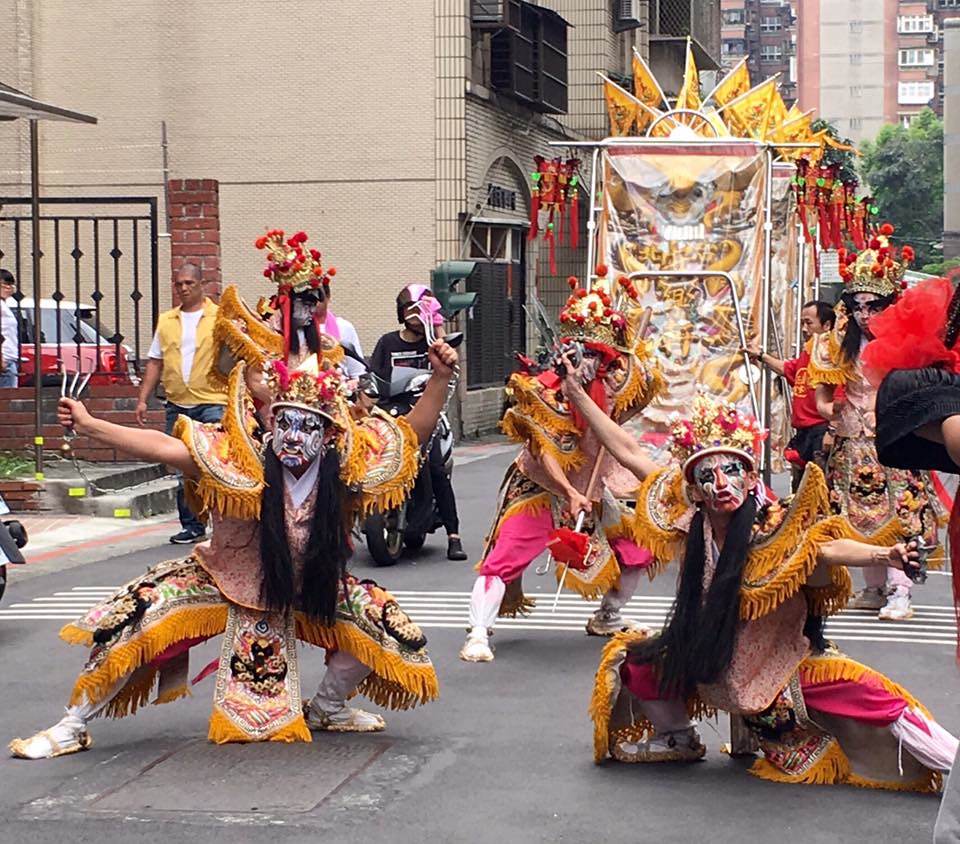
Some people, for sure, probably aren't even thinking along those lines and think these are the things keeping Taipei from being a truly modern city - quiet, clean and upscale.
Which is of course utter nonsense.
These things are what make Taipei Taipei, rather than, I dunno, some crappy box-building city in China with streaky luxury apartment complexes rotting out by the 80th ring road, or Beijing which is even worse than that despite the cultural heritage because you literally can't breath and they are slowly razing anything of interest (rather like the cultural razing of temple parades and other items of cultural interest in Taipei in favor of luxury apartments, boring civic celebrations and department stores?), or Duluth or Peoria or Des Moines or some other city I wouldn't want to live in that feels like a stand-in for a boring, poorly-planned metropolis more known for suburbs than actual urban vibrancy.
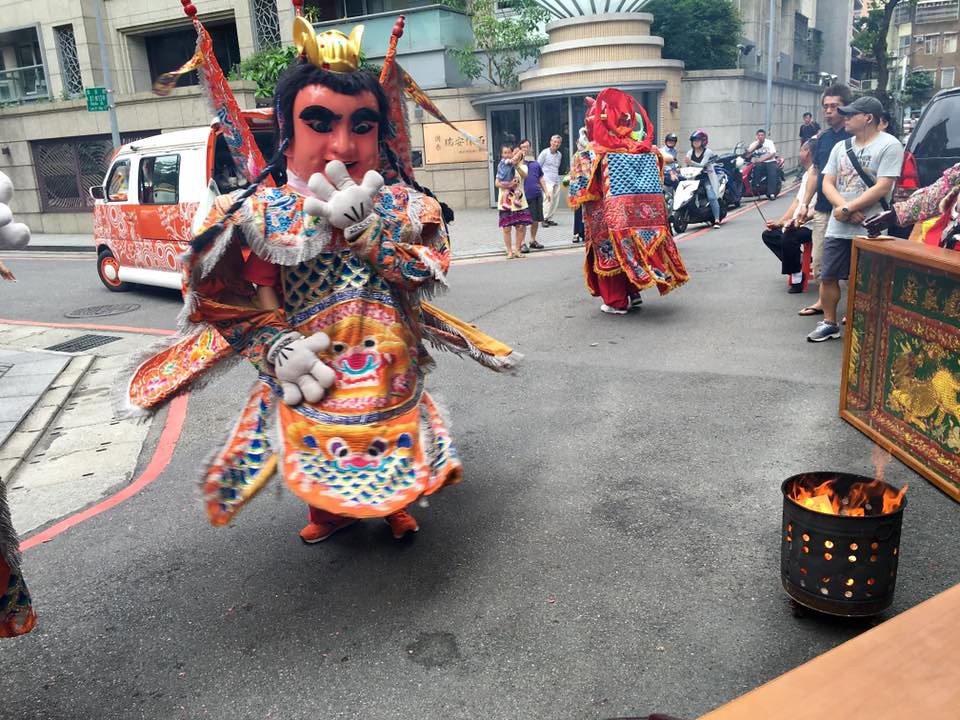
I mean, if I wanted to live in Duluth I would have moved to Duluth. If I wanted to live in 屁眼, China, I would have moved there.
I live in Taipei because I want to be in Taipei, and a part of that is the street life, the overall street-level liveliness, and the cultural aspects of living here. I'll put up with a traffic jam because a ten-foot god is walking down the road for that.
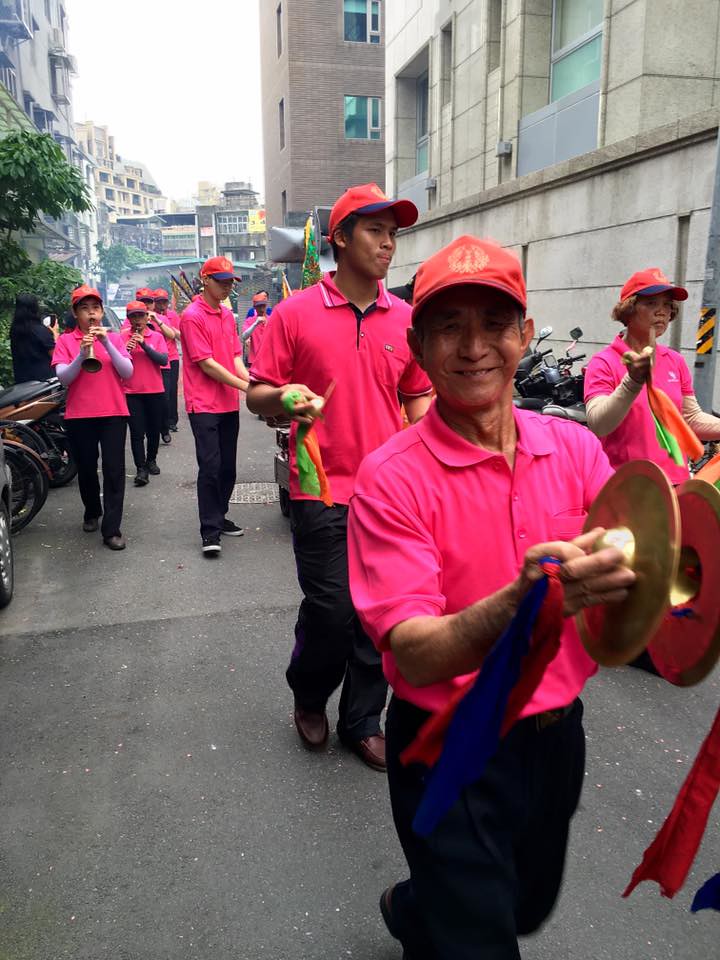
Some people do say it's because so many temple events are connected with gangsters, because gangs, temples, businessmen and politicians are in many ways just an inbred group of cronies in Taiwan.
Sure, that's true.
But who cares?
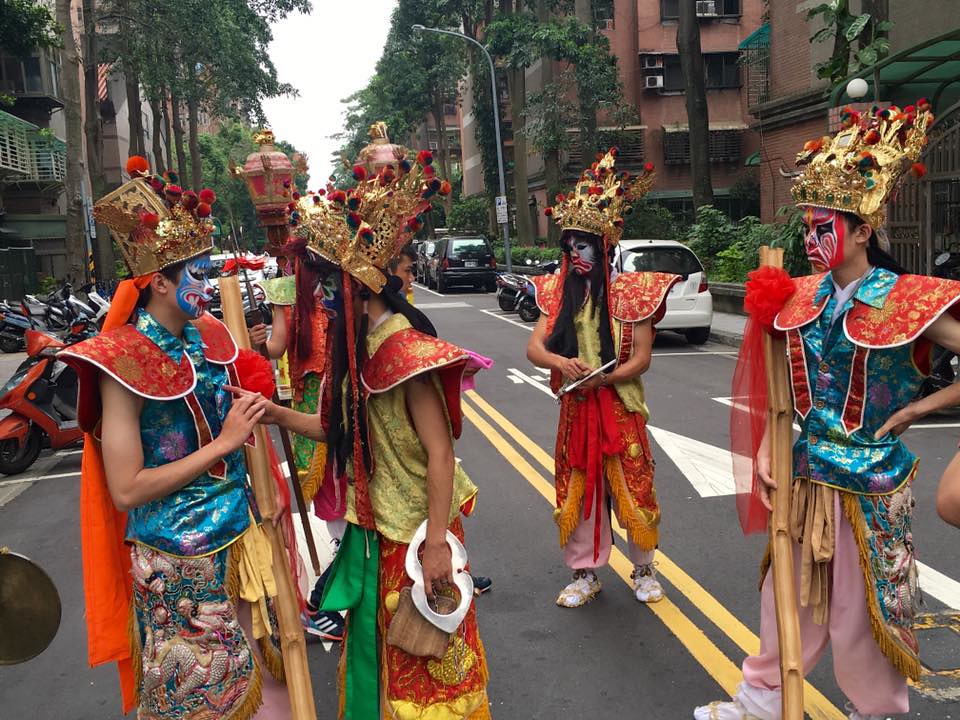
Honestly, of all the things gangs in Taiwan are involved in, this is by a very wide margin the least problematic. Stopping temple parades isn't going to make gangs go away, and even if there is gang activity inherent in them, it's fairly harmless as gang activity goes.
I mean, imagine if the best pasta joint in town were run by the local mafia (which in New York might very well be the case, though not always). Would you want to stop the gang from doing anything illegal or truly problematic? Sure.
Does that mean the pasta restaurant is the problem, and you shouldn't enjoy delicious pasta there? I don't think so. It just doesn't seem like a very strong reason to me. You want to crack down on gangs, crack down on scammers, prostitution rings/pimps/brothels, drug cartels and a scary large percentage of politicians and big business.
The temple parades are not the problem.
Anyway, rant over, enjoy a few more photos:
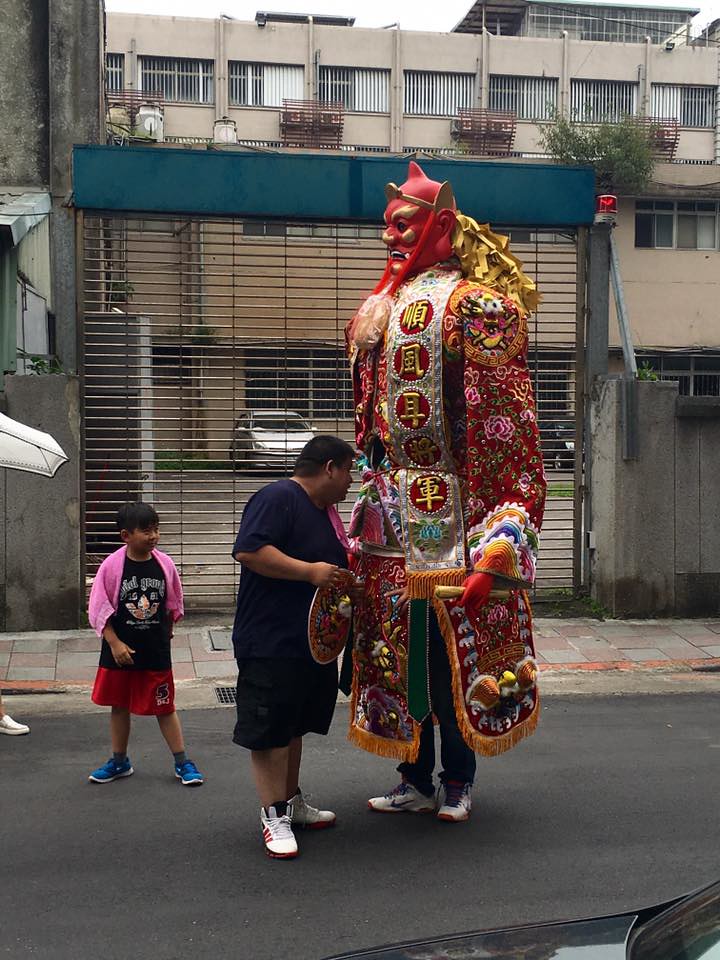
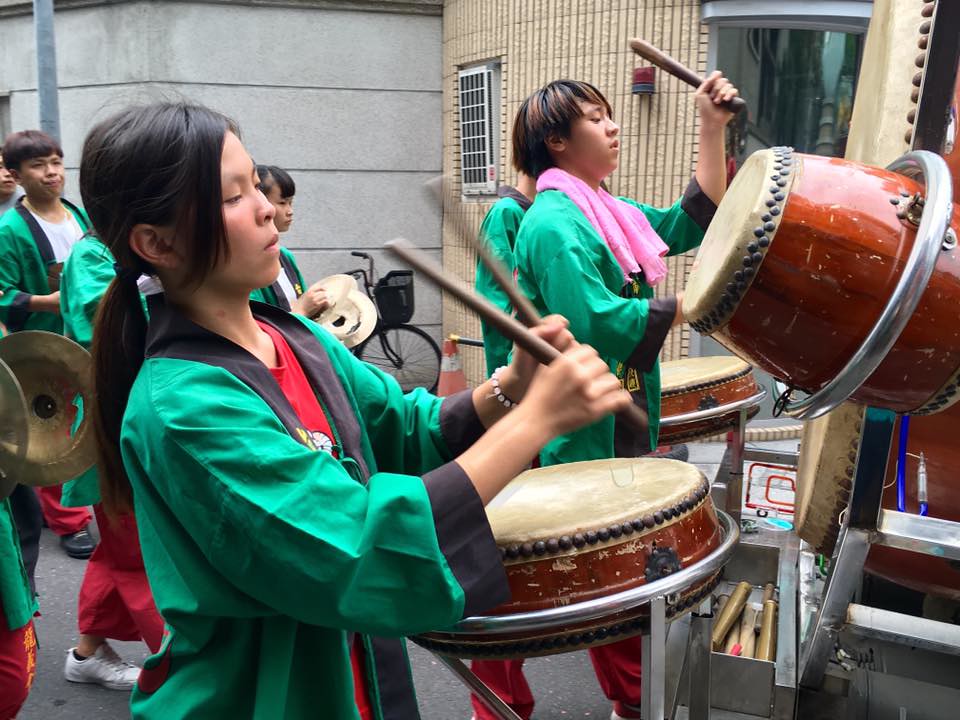
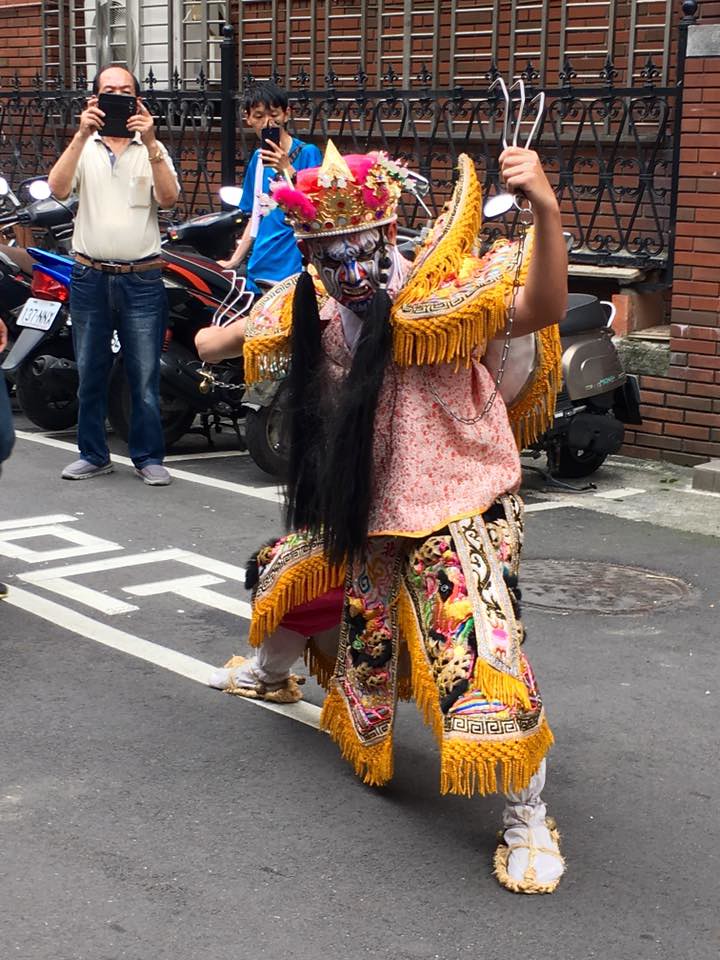
Tuesday, May 3, 2016
So what is up with these Dayuling tea farms?
I'm sure a lot of you have read the Vice article on the destruction of the Dayuling high mountain oolong tea farms, which, despite having tea as something of a theme in my blog, I have refrained from commenting on as I felt as though there was probably more to the story.
Just to summarize, Clarissa Wei (the writer of the original Vice article) writes about how the government has begun enforcing high-mountain reforestation regulations, destroying agriculture at those elevations so as to prevent erosion - which is a real problem, I have to say. How much of a problem depends on the type, age and quality of the agriculture cultivated. She notes that while there are typical tea farms with younger bushes that don't secure soil against erosion, which use harmful fertilizers and pesticides to boot, that sustainable farms whose tea plants are better at preventing erosion than the saplings the government is planting, and which use organic, chemical-free growing methods, are also being destroyed. This is a problem not only because tea farming is the livelihood of the farmers affected, mostly ROC veterans given land as their pension, but also because high mountain oolong is a Taiwanese specialty commanding market presence, good international branding for Taiwan and, yes, high prices. Destroying it affects a lot of people - not just the farmers but the entire Taiwanese tea industry and international recognition Taiwan gets for its high-quality high mountain oolong tea.
That's basically the point - it's all very clear, but it does read as if Wei talked to the farmers affected but never asked anyone from the government for comment.
Then this article came out on Eco-Cha detailing the other side of the argument.
I'm not sure I buy this side of the story either.
Here are some questions I have about that rebuttal:
In recent decades, designated sections of this land can be rented from the government for tree growing and harvesting only, but not for agricultural use.
Wait - what?
I had been under the impression that that land was given to veterans as a pension, not that it was rented. And if you give (or even rent - I suppose with eminent domain all land is "rented" to an extent? Maybe?) land to someone as a pension, how is it OK to change the rules governing that land on them and expect that everything is going to go smoothly?
I'm not saying the new regulations are "wrong" - they're probably not. Sustainability is in everyone's best interests in the long term. But I was under the impression that that land was owned by the veterans occupying it, and therefore eradicating their sources of income should be far more problematic as it's a lot harder to change the laws pertaining to the use of such land than it is for 'rented' land. How could it even be rented if it was the veterans' pensions? Renting implies paying money to occupy a place and that doesn't seem to be the case here. Am I wrong?
OK but is the tea actually better? Not necessarily, but Eco-Cha is implying it's not, generally. I'd say it is.
Just to summarize, Clarissa Wei (the writer of the original Vice article) writes about how the government has begun enforcing high-mountain reforestation regulations, destroying agriculture at those elevations so as to prevent erosion - which is a real problem, I have to say. How much of a problem depends on the type, age and quality of the agriculture cultivated. She notes that while there are typical tea farms with younger bushes that don't secure soil against erosion, which use harmful fertilizers and pesticides to boot, that sustainable farms whose tea plants are better at preventing erosion than the saplings the government is planting, and which use organic, chemical-free growing methods, are also being destroyed. This is a problem not only because tea farming is the livelihood of the farmers affected, mostly ROC veterans given land as their pension, but also because high mountain oolong is a Taiwanese specialty commanding market presence, good international branding for Taiwan and, yes, high prices. Destroying it affects a lot of people - not just the farmers but the entire Taiwanese tea industry and international recognition Taiwan gets for its high-quality high mountain oolong tea.
That's basically the point - it's all very clear, but it does read as if Wei talked to the farmers affected but never asked anyone from the government for comment.
Then this article came out on Eco-Cha detailing the other side of the argument.
I'm not sure I buy this side of the story either.
Here are some questions I have about that rebuttal:
In recent decades, designated sections of this land can be rented from the government for tree growing and harvesting only, but not for agricultural use.
Wait - what?
I had been under the impression that that land was given to veterans as a pension, not that it was rented. And if you give (or even rent - I suppose with eminent domain all land is "rented" to an extent? Maybe?) land to someone as a pension, how is it OK to change the rules governing that land on them and expect that everything is going to go smoothly?
I'm not saying the new regulations are "wrong" - they're probably not. Sustainability is in everyone's best interests in the long term. But I was under the impression that that land was owned by the veterans occupying it, and therefore eradicating their sources of income should be far more problematic as it's a lot harder to change the laws pertaining to the use of such land than it is for 'rented' land. How could it even be rented if it was the veterans' pensions? Renting implies paying money to occupy a place and that doesn't seem to be the case here. Am I wrong?
Since the farmers did not comply with the demand to eradicate their violations of forest land use, the government implemented the removal of farm crops and any buildings that were constructed on forest land.
Next question - what good is land given to veterans if the law then states they can't do anything with it, even have buildings? "Here's some land. You can do jack all with it except look at trees, but...here it is." I don't quite see the point of that.
And remember, the farmers interviewed for the Vice article pointed out that the government itself told them to grow tea - I mean the KMT was the government then, that's what brutal dictatorship is, and Chiang Kai-shek basically was the KMT. So I can understand a farmer being upset that in the 1950s he's told to grow tea by the government of the ROC and in the 2000s he's then told he has to give up his business by that same government (in name, at least). How would you feel if an economic development director from the government encouraged you to open a store on your first floor, you did so, it was doing well, and then that director's successor said "sorry, you'll have to close the store and personally bear any losses from doing so." You'd be pissed too, and "it's unfortunate that..." really doesn't cut it.
So my question would be, what compensation for the loss of their business and livelihood is the government going to give to these farmers after changing the regulations on them decades after giving (giving? I thought giving) them this land as their 'pension'?
And remember, the farmers interviewed for the Vice article pointed out that the government itself told them to grow tea - I mean the KMT was the government then, that's what brutal dictatorship is, and Chiang Kai-shek basically was the KMT. So I can understand a farmer being upset that in the 1950s he's told to grow tea by the government of the ROC and in the 2000s he's then told he has to give up his business by that same government (in name, at least). How would you feel if an economic development director from the government encouraged you to open a store on your first floor, you did so, it was doing well, and then that director's successor said "sorry, you'll have to close the store and personally bear any losses from doing so." You'd be pissed too, and "it's unfortunate that..." really doesn't cut it.
So my question would be, what compensation for the loss of their business and livelihood is the government going to give to these farmers after changing the regulations on them decades after giving (giving? I thought giving) them this land as their 'pension'?
The farm that was highlighted in the recent story by Munchies was not spared because it was evidently subject to the same stipulations as other nearby farms that have already been removed in recent years. The government claimed that there was no way to preserve it without demonstrating a bias that discriminated against the farms already affected.
Again - what?
First, is it not possible to craft regulations so that every farm has to undergo an inspection to determine if they are using sustainable practices, and allow the ones that are to continue to exist while shutting down the ones that aren't? Surely this is not such a difficult thing for a successful developed country to accomplish? The whole point of regulations is that they should suit the situation in order to improve the country for everyone. It is challenging but not impossible to write more sensitively and intelligently implementable regulations. Not doing so isn't 'avoiding bias', it's straight-up laziness.
Second, Ec0-Cha says below that their sources of high mountain oolong are unaffected because they embody sustainable practice that involves responsible use of resources and long-term profit gains.
But that's the whole point - the farmers Wei interviewed also embodied sustainable practices and responsible use of resources. So how come you are fine with your sources being unaffected, but any other source affected, even if it is just as sustainable and responsibly managed, is fair game because to do otherwise would demonstrate "bias"? This doesn't make sense.
If the regulations are applied in a blanket fashion (which is obviously not what I would advocate), Eco-Cha's sources should be affected too. If not, the Chen farm should also have been spared.
Can't have your tea and drink it too. At least own up to the double standard of that line of reasoning, Eco-Cha.
Plus, as far as I know other high-mountain oolong growing regions such as Fushoushan are unaffected. Fushoushan is a fairly popular mountain tourist destination with government ties.
And finally, this article doesn't address the point made in Vice that plenty of homestays and other land uses aren't affected, although they technically should be.
Again - what?
First, is it not possible to craft regulations so that every farm has to undergo an inspection to determine if they are using sustainable practices, and allow the ones that are to continue to exist while shutting down the ones that aren't? Surely this is not such a difficult thing for a successful developed country to accomplish? The whole point of regulations is that they should suit the situation in order to improve the country for everyone. It is challenging but not impossible to write more sensitively and intelligently implementable regulations. Not doing so isn't 'avoiding bias', it's straight-up laziness.
Second, Ec0-Cha says below that their sources of high mountain oolong are unaffected because they embody sustainable practice that involves responsible use of resources and long-term profit gains.
But that's the whole point - the farmers Wei interviewed also embodied sustainable practices and responsible use of resources. So how come you are fine with your sources being unaffected, but any other source affected, even if it is just as sustainable and responsibly managed, is fair game because to do otherwise would demonstrate "bias"? This doesn't make sense.
If the regulations are applied in a blanket fashion (which is obviously not what I would advocate), Eco-Cha's sources should be affected too. If not, the Chen farm should also have been spared.
Can't have your tea and drink it too. At least own up to the double standard of that line of reasoning, Eco-Cha.
Plus, as far as I know other high-mountain oolong growing regions such as Fushoushan are unaffected. Fushoushan is a fairly popular mountain tourist destination with government ties.
And finally, this article doesn't address the point made in Vice that plenty of homestays and other land uses aren't affected, although they technically should be.
So what's this about "not demonstrating bias"?
Give me a damn break.
Give me a damn break.
This basically was bound to happen sooner or later, and it turned out to be later — after the local private sector made a massive profit from producing High Mountain Tea at a price that far exceeded anywhere else in Taiwan. Simply put, they capitalized on being the highest elevation tea farms in Taiwan. Tea from this area sold for anywhere from double to ten times the amount of other sources that classify as High Mountain Tea — just because it boasted the status of tea grown at the highest elevation.
Sure. But you are implying that that elevation doesn't affect the tea - that it is only more expensive because it is grown at a high elevation. You do not address whether it actually is better.
I am far from a tea expert but as a tea-loving amateur, I'd go out on a tea-bush branch and say that yes, it is in fact better. The elevation plays a part but the tea farms being destroyed aren't necessarily producing mediocre tea at high prices just because they command high prices due to elevation. I find that tea to be excellent, though I'm also a fan of lower-elevation Pinglin tea.
In addition to the fact that it was against regulations, it is an ironic outcome of the marketing strategy that popularized this new tea type simply referred to as "Gao Shan Cha" or High Mountain Tea. The value of High Mountain Tea has been promoted for the last 30 years as being "the higher the elevation, the better" in terms of quality. This of course is not necessarily true. Quality tea production depends on knowledgeable and responsible farm management combined with skill and care in processing the harvested leaves. Elevation is definitely a significant, but hardly the decisive factor in determining the quality of tea produced.
Sure. But you are implying that that elevation doesn't affect the tea - that it is only more expensive because it is grown at a high elevation. You do not address whether it actually is better.
I am far from a tea expert but as a tea-loving amateur, I'd go out on a tea-bush branch and say that yes, it is in fact better. The elevation plays a part but the tea farms being destroyed aren't necessarily producing mediocre tea at high prices just because they command high prices due to elevation. I find that tea to be excellent, though I'm also a fan of lower-elevation Pinglin tea.
In addition to the fact that it was against regulations, it is an ironic outcome of the marketing strategy that popularized this new tea type simply referred to as "Gao Shan Cha" or High Mountain Tea. The value of High Mountain Tea has been promoted for the last 30 years as being "the higher the elevation, the better" in terms of quality. This of course is not necessarily true. Quality tea production depends on knowledgeable and responsible farm management combined with skill and care in processing the harvested leaves. Elevation is definitely a significant, but hardly the decisive factor in determining the quality of tea produced.
OK but is the tea actually better? Not necessarily, but Eco-Cha is implying it's not, generally. I'd say it is.
Yet this is not an anomaly in our modern age where populations and subsequent developments of land have rapidly advanced without proper implementation of sustainable planning.
Again the farmer interviewed in the article is using sustainable practices and planning - at least according to Wei - so you can't lay that at the feet of "it wasn't sustainable" if it actually is. You really can't have it both ways.
All said and done, we are happy to say that none our sources of High Mountain Tea have been affected by these recent regulatory actions by the government. This is because our sources embody sustainable practice that involves responsible use of resources and long-term profit gains.
Again the farmer interviewed in the article is using sustainable practices and planning - at least according to Wei - so you can't lay that at the feet of "it wasn't sustainable" if it actually is. You really can't have it both ways.
All said and done, we are happy to say that none our sources of High Mountain Tea have been affected by these recent regulatory actions by the government. This is because our sources embody sustainable practice that involves responsible use of resources and long-term profit gains.
Just like the Chen farm at least according to Wei. So why are yours safe again and his not? If it's to "avoid bias" shouldn't your sources be eradicated too regardless of their sustainability? So...?
Perhaps what you mean is "our sources are farmed on land not subject to these stipulations", but if it's high mountain oolong I'd be curious about why not. Also, if this is true, to say "our sources are spared because they are sustainable" when in fact they are spared because they just happen to fall outside of regulated zones is lazy writing. Reeks of an excuse rather than a true explanation. Which is it? Be clear.
Perhaps what you mean is "our sources are farmed on land not subject to these stipulations", but if it's high mountain oolong I'd be curious about why not. Also, if this is true, to say "our sources are spared because they are sustainable" when in fact they are spared because they just happen to fall outside of regulated zones is lazy writing. Reeks of an excuse rather than a true explanation. Which is it? Be clear.
We hope that this information has been helpful in clarifying the issue.
Not in the slightest.
Anyone else care to try?
Not in the slightest.
Anyone else care to try?
Monday, May 2, 2016
A Taiwanese State of Mind: Of Localism and Identity
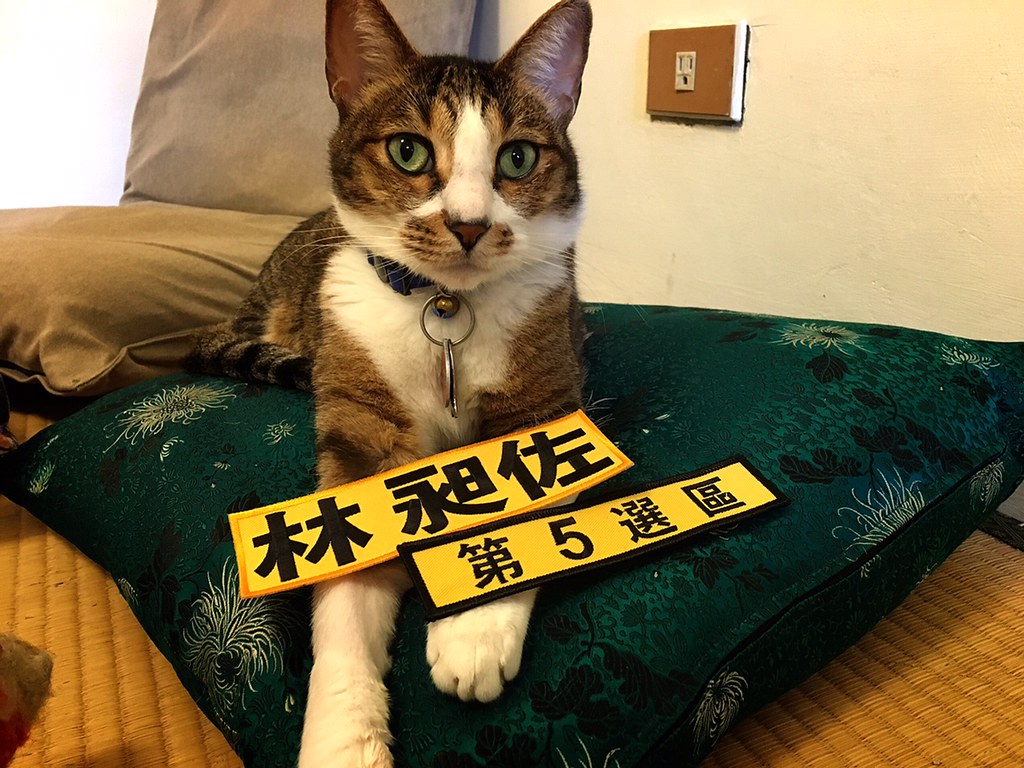
I may not have Taiwanese kiddies, but I do have Taiwanese kitties.
There are two things that are complicated to approach as a liberal foreigner who watches Taiwanese politics (especially through a non-expert lens, such as myself): which party to support, if any - certainly many Taiwanese have yet to find a party that appeals to them - and how to essentially support localist, to an extent "populist", movements.
Until the inception of the New Power Party, feeling a bit uncomfortable about the centrist rhetoric and general corruption (though not nearly as bad as the corruption of the KMT), not to mention the seeming incompetence at pushing their own platforms and ideas rather than simply reacting to KMT initiatives, I tenuously, uncomfortably, supported the TSU (Taiwan Solidarity Union). I liked their straightforward clarity of thought in the idea that Taiwan is not a part of China and this is just a logical conclusion based not only on history but on the reality of Taiwan's current situation and general public will. Their very rational pointing out of the fact that Mandarin was never the native language of Taiwan - it was forced on the Taiwanese by the KMT, who, when they came here were more of a colonizing force flanked by quite a few political refugees, but then took over the place and acted as though they had the right to rule despite nobody in Taiwan having much desire to be ruled by them. What is an unwelcome occupying force? A colonial one. Duh. Their noting that transitional justice simply has not been adequate, and many Taiwanese families still do not know what happened to their ancestors in the White Terror and martial law era.
All very clear, all very obvious.
But I never quite felt comfortable with my own support, because while at various protests and events the TSU had always been welcoming to me, there was a distinct underlying impression that many of their supporters did secretly believe in the idea of Hoklo nativism and tended, with their "Taiwan for the Taiwanese" (implication: Taiwanese = Hoklo) rhetoric, to drive away other groups in Taiwan , like Hakka and the various aboriginal groups, who might have otherwise tended to agree with their pro-independence platforms. I'm sure some of this is KMT propaganda, but that aside, reading their own literature, from the TSU as a source, also carried this impression.
I guess I always wondered if their "Taiwan for the Taiwanese, let's all speak Hoklo" rhetoric, despite their friendliness to me, would eventually morph into anti-foreigner sentiment in general. I'm a foreigner. How can I possibly feel totally comfortable with that?
So when the NPP (New Power Party) came along, it was like a breath of fresh air. Finally, an unashamedly pro-independence party that is socially liberal as I am, has made worker's rights a central tenet of their party platform (though I feel $26K in their 'fight for 26K' is actually too low), an anti-death penalty, strongly pro-LGBT party I could really get behind, with the added benefit of being founded by student activists and other Third Force powers that I have supported in the past. Plus, they are nationalists in that they believe, without reservation, in de jure Taiwanese independence, but they are not isolationists in the sense that so many nationalist parties are (from their platform: The New Power Party advocates that Taiwan actively participate in international society, that it should uphold conscience and defend human rights and justice more, and that it should carry out its international responsibilities.)
Finally, a party I can fully support, right?
Well, I'm still not so sure.
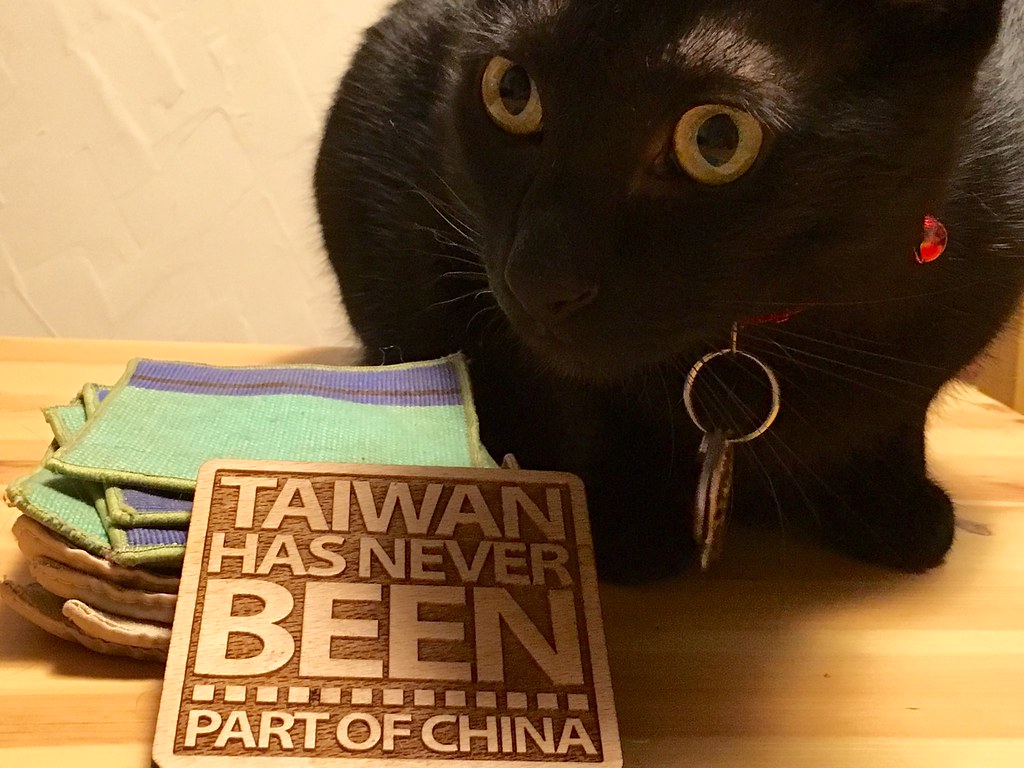
It has gone largely unnoticed, but the New Power Party is one of the groups resisting changes to the laws regulating foreign workers in Taiwan:
On top of that, loosening the requirements will play into the hands of employers who wish to maintain the current low salary structures. So far, several of the newly elected legislators, including the New Power Party (NPP) caucus, have publicly spoken out against the modified draft.
This is a bit of a blow - in that it blows quite a bit.
A few thoughts about the proposed changes to laws regulating, well, people like me. Foreigners. First of all, this sort of sentiment bothers me in similar ways to my not-unconditional support of Bernie Sanders. Sanders too, and many left-wing populists like him, seems to think that easing immigration restrictions drives down salaries, despite little evidence that this is actually the case and some evidence that it is, in fact, untrue. From the Washington Post article:
Today, he likes to talk about his opposition to it in humanitarian terms, calling guest-worker programs semi-slavery. But at the time, Sanders's public comments reflected on the economics of the program — specifically, his concern that bringing in guest workers would drive down wages for low-income Americans.
So, with my discomfort at Sanders touting - or having touted - an economic anti-immigrant platform that I don't support, obviously it would bother me the the New Power Party in Taiwan has taken up similar rhetoric.
Truly, we are not the ones driving down wages in Taiwan. We are right there with you, tryin' to earn a crust of bread through labor. To take an old cliche - why is the NPP pointing at foreign labor as a cause of stagnant wages? We are going after the same crumbs, yes, but look at your bosses, who took the whole damn cookie.
Honestly, the proposal to eliminate the minimum salary requirement and the onerous hiring requirements is a no-brainer, because Western white collar workers won't take less than what the law regulates anyway unless they have a reason not to, and even non-Western white collar professionals from, say, the Philippines or India, do expect international-level salaries. I doubt anyone in that segment of society, even from considerably less wealthy countries, went through a long education to become a professional only to take low pay in Taiwan. The folks who want to see restrictions eased don't want to accept stagnant pay any more than Taiwanese citizens do!
The few that would take such pay cuts or who would need to get a job without having the requisite Master's degree or two years' documented experience in the field are not that great in number and are not much different from local Taiwanese. They are not going to undercut locals - they're just not. They don't want to. They aren't quite me - I am an English teacher and corporate trainer by profession and with an APRC the rules don't quite apply to me. But, they are people like, say, a twentysomething who wants to live here but not teach English, and yet struggles to find a non-teaching job because the law keeps many firms from hiring people like her. Who isn't trying to take what Taiwanese have but rather just wants to build a good life for herself, and loves living in Taiwan.
It feels unnecessarily draconian towards an economic end that hasn't been shown to actually be a problem, and oddly self-destructive for the New Power Party for two reasons:
The first is that they themselves support greater international participation for Taiwan. Allowing more foreigners to come here and work without having to teach English (or wait until they are established enough in their fields that the low salaries on offer in Taiwan do not appeal to them) is a great way to do that. It would certainly help alleviate the feeling that Taiwan is a professional backwater.
The second is that, hey, young liberal twentysomethings - which is who most of these new workers would be - are natural allies to the New Power Party! The majority of them are the sort of workers-rights-loving, LGBT-friendly, anti-death-penalty, environmentalist, Taiwan-loving progressives that the New Power Party would be wise to court, if not for their votes (we can't vote) then for their international presence and ability to use soft power to share the cause of Taiwan with the world.
How better to raise the profile of Taiwan in the international sphere than to make it easier for this demographic of young folks to come, work here, fall in love with Taiwan and then go home raving about what a great country it is? How it is not China and deserves more from the world?
In short, we are natural political allies, NPP. Please don't do this to us. Don't throw us under the bus when we're not the ones who are taking the Taiwanese workers' cookie.
Set your sights instead on the bosses, business owners and powers-that-be who are taking your cookie.
Another reason this is problematic is that it diminishes hope for wannabe-permanent immigrants like us who are not sure we can stay forever simply because there is no viable path to citizenship for us (which is again done purposely, and is again extremely racist as the government allows its own citizens to have dual citizenship), and a lack of citizenship causes problems in our daily lives that may cause many to decide to leave. As I've written, we may be among that cohort someday.
Why should this matter?
Well, both the Taiwanese independence movement and the Third Force/student activist/New Power Party have been accused of being 'populist' - that they channel not only grassroots anti-elitist - in this case anti-KMT - sentiments (an essential component of populism) but, as an inevitable outcome of that, nativist anti-foreigner - in this case anti-China - sentiments. That they are extremely localist to the point of wanting 'Taiwanese independence' along the same lines as UKIP's "Britain for the British" or Trumpian "Build That Wall!" rhetoric.
First, some thoughts about populism. It's definitely got a bad reputation these days - think THEY TOOK OUR JOBS-style anti-globalization, pro-isolationist right-wing anger. But the original term "populism" comes from the idea of "from the people", and doesn't necessarily have to mean everyday people and Joe the Plumber types being anti-foreigner. That's right-wing populism, but the term itself has several possible definitions, including left-wing populism which only really shares a strain of anti-elitism with other versions but otherwise tends to appeal to a socialist sense of community and shared resources.
Yet, if you perhaps think that being a part of the UK isn't the best thing for Scotland but are not necessarily an isolationist/splittist/anti-foreigner type, or you think maybe the EU isn't quite working for you as a country but are otherwise more or less a socialist, or think that Taiwan ought to be de jure independent from China but don't see that nationalism as being anti-China but rather pro-Taiwan, you tend to get lumped into the right-wing populist camp by critics, whether you belong there or not.
And I don't think Taiwan belongs there. I really don't.
It also bothers me that left-wing and right-wing populists share not only an anti-elite establishment bent, but also an anti-immigrant bent. The latter based on ethnocentric zealotry of which only one component is "THEY TOOK OUR JOBS", the former based only on an economic argument that has no real basis of proof.
It is possible to be in favor of creating your own nation - in favor of self-determination in fact - but not an ethnic zealot nor an anti-foreigner isolationist. To recognize that perhaps free trade isn't always the best idea economically, that labor needs a fair shake, but to recognize that immigrants are decidedly not the problem. This is where I feel Taiwan's future is.
There aren't many countries or territories in Asia that have managed to build nations without an ethnic foundation - I can only think of Singapore and Hong Kong off the top of my head as being truly internationally diverse (others, such as Indonesia, Burma and India, are multi-ethnic but all ethnicities are local). You don't have to be Malay or Hokkien to be Singaporean, and you don't have to be Cantonese to be Hong Konger (although the Chinese government has something to say about that, wanting only people of Chinese ethnicity to be Chinese citizens and creating a problem of statelessness in Hong Kong).
I know I can never 'be Chinese', nor would I want to be. That's an ethnicity, and I am not ethnically Chinese. But there are countries - mostly Western ones - where you can 'be' that nationality without having to be a certain ethnicity. I do wonder, however, if I or someone like me could ever 'become Taiwanese' the same way one can 'become American', not only in official name (it is possible, just often insurmountably difficult, to get ROC citizenship) but also in the public consciousness. If Taiwanese doesn't have to mean Hoklo or "Han Chinese", if it can include aborigines and Hakka (whom I realize are technically Han, yes) and the children of Taiwanese with foreign spouses, can Taiwanese also mean, say, someone like me? Or, even more fittingly, a 'foreigner' who was born here? Could I actually live the 'Taiwanese dream', or is that closed to me because of my ethnicity?
I like to think that it could, and for every "you're a foreigner and you'll always be one even if you were born here", I feel like I meet someone for whom the "multiethnic diverse nation of Taiwan" idea is not only not crazy, but actually inviting. Who is happy to admit that Taiwan has had such a tumultuous history and is home to enough different kinds of people that being Taiwanese is a state of mind, not an ethnicity you are born with.
I like to think, anyway, that Taiwan might be something of a thought leader in Asia in this area. Certainly despite some setbacks it is a progressive nation by Asian standards.
This feels, to me, like a natural platform to support for the pro-international-engagement New Power Party, so again, it's disappointing that they're adopting the same problematic 'immigrants are a problem' rhetoric that a lot of lefty 'populists' really need to get out of their system. It certainly isn't going to come from the KMT (are they not the architects of the original anti-foreigner citizenship and worker laws?), the DPP doesn't seem particularly interested, the TSU, as above, is a bit too nativist, but I am actually surprised it's not on the NPP docket. If they're trying to differentiate themselves from the Taiwan = Hoklo reputation of the TSU, this is a great way to do it.
But getting over this "don't make it easier for foreigners, they're lowering our wages' hump seems like it's going to be a problem. If we can't even change the laws regarding who can work here as a foreign professional, how are we going to create a path to 'being Taiwanese' - to making it realistically possible to get citizenship and live here as regular adults and not eternal guests?
I want to wholeheartedly embrace the NPP...but again, as a foreigner who just wants a better life and isn't looking to take anything from Taiwanese, who is most definitively not holding the cookie that's been kept from local low-wage workers, I'm not sure I can. They don't seem to want to let me live the 'Taiwanese dream' any more than any other party, and it's a damn shame.
Do better.
Subscribe to:
Comments (Atom)

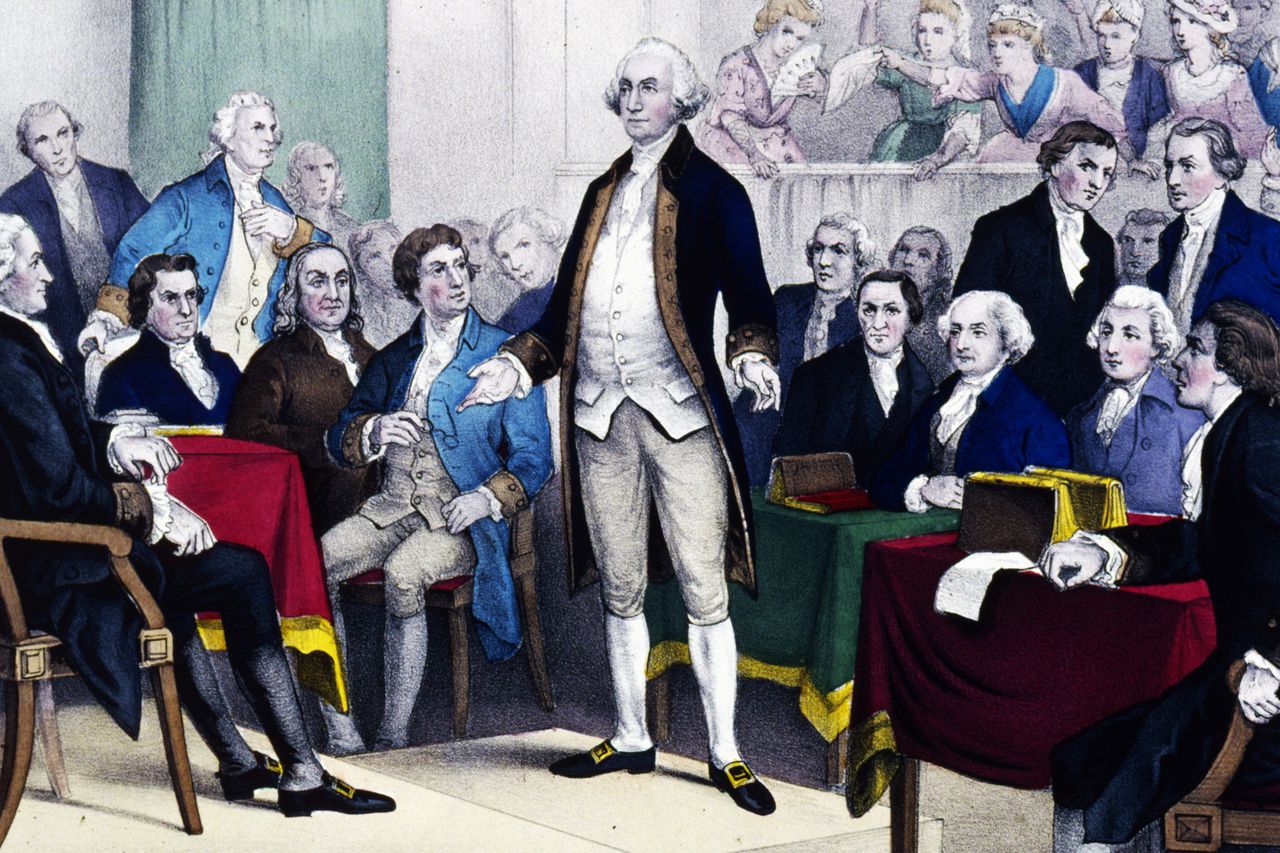

/H026_Pants01%20.jpg)